
2 O 2 3


SUSTAINABILITY REPORT YOUR P A R T NER IN S U S T BANIA L E F RTSERO Y
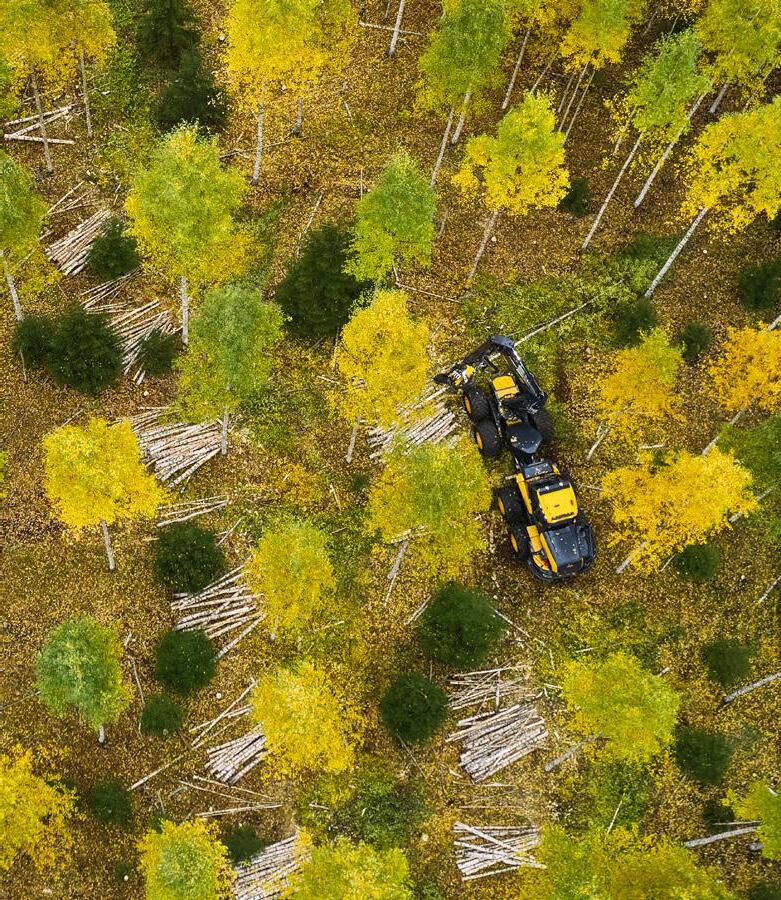
2 01 Environmental responsibility in 2023 , we set goals for the first time for waste generated in our operations. 16 p. Our sustainability goals 4 Goals and measures 6 Environmental responsibility 16 Social responsibility 52 Governance 82 Sustainability reporting at Ponsse 102 GRI index 103 YOUR P A R T NER IN S U S T LBANIA E F O R YRTSE
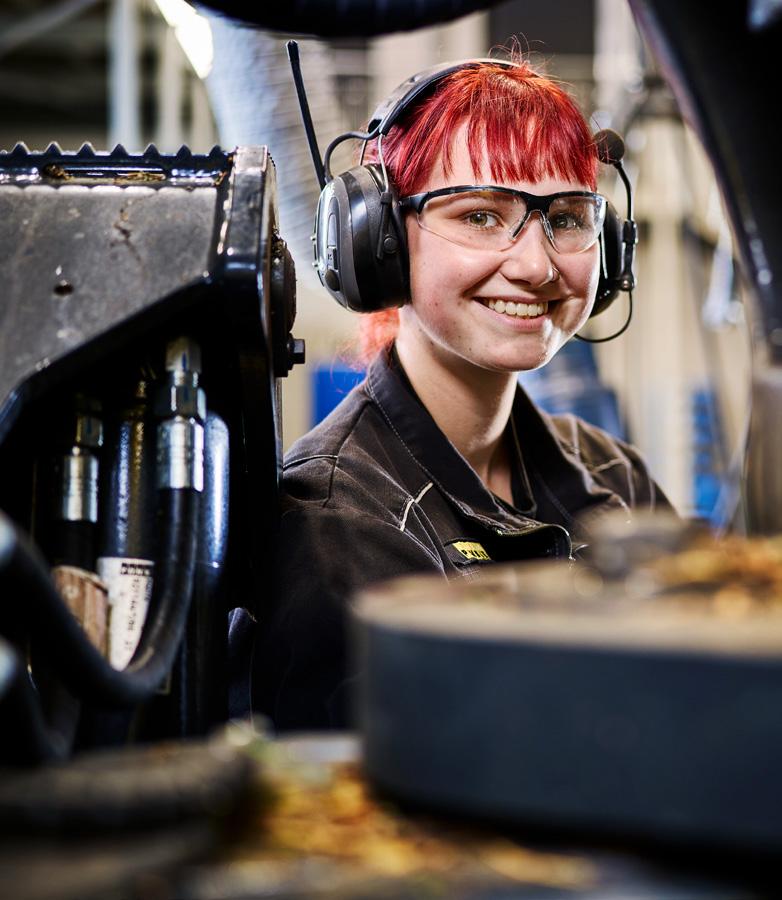
Social responsibility Governance
we provided a break exercise program and bicycle benefit for all our personnel in Finland.
we initiated the leading Forward’27 project, around which we will build a research ecosystem.
52 p. 82 p.
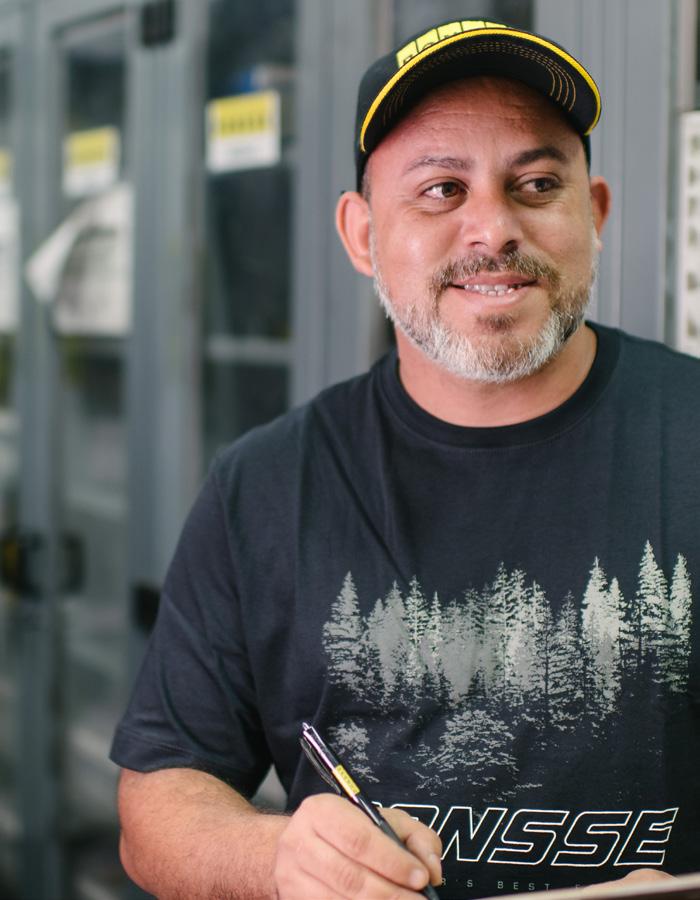
3
03
02
PEOPLE
We improve the wellbeing of our people
Ponsse is an equal and non-discriminating working community, in which everyone can work safely. We appreciate one another and take good care of each other, and our customers and network. Our machines are safe and ergonomic for their users.
Our strategic sustainability goals

SOLUTIONS
We innovate sustainable solutions that respect nature
Our product and service solutions enable sustainable forestry. We bear responsibility for the machine life cycle and extend it through excellent maintenance services. We develop solutions that promote the circular economy and reduce the environmental impacts of machines.
OPERATIONS
–
We develop our operations while respecting nature
We know the environmental impacts of our operations and work systematically to improve them. In our operations, we seek carbon neutrality and material efficiency.
COMMUNITY
–
We are a reliable partner who values community
Honesty, ethics, and communality are at the core of the Ponsse spirit. Good corporate governance and our Code of Conduct steer us to treat people equally, conduct sustainable business and engage in confidential cooperation. Working as a community is important to us wherever we operate.
4
–
–

Responsibility and sustainable development will be key success factors in our future and prerequisites for the continuity of our operations. Here at Ponsse, we are doing meaningful work as part of sustainable forestry. This motivates the Ponsse people and our entire international network. We believe that our technologies and new business models give us more opportunities to implement the principles of sustainable development in forestry.


Productive harvesting that respects the environment supports the regeneration of forests and enables the use of valuable raw materials in long-lasting and high-quality wood-based products. The significance of renewable wood in replacing fossil raw materials is massive, and innovation in the industry is fast-paced.
Our R&D activities continuously seek climate- and nature-friendly solutions, and we aim to become carbonneutral in our operations. We still have a long way to go to achieve these goals, but we want to get there and are heading in the right direction.
The Ponsse culture, developed over five decades, is our asset, and our sustainable development goals have given it new strength. Ponsse will head into 2024 with its familiar, but updated, values: We truly care; We work for customers; We are honest; and We are open for renewal. These values constitute the Ponsse spirit, in which “we” is always more important than “I”. The Ponsse spirit is conveyed in our daily work and in our attitudes towards each other. It is conveyed to our customers through our daily activities, around which all cooperation and trust between us are built. We exist for our customers.
juho nummela, President and CEO katja paananen, Chief Responsibility Director
5
Photo Geran de Klerk / Unsplash
We improve the wellbeing of our people
KPI
Lost time injury frequency rate (LTIFR) and the number of safety observations
Long-term goal
Zero accidents
Employee engagement (eNPS)
Management quality
Excellent employee engagement, eNPS >40
Outcome in 2023
• LTIFR 10.7 (2022: 11.8)
• 8,106 safety observations (2022: 3,982)
Goals and measures for 2024
• LTIFR <5, 8,500 safety observations
• Developing the method of continuous improvement in safety and preventive safety activities
Voluntary employee turnover
High-quality management >3, on a scale from 1 to 4
• eNPS 31 (2022: 22) (on a scale from -100 to 100)
• Developing the engaging eNPS feedback process, eNPS >40
Management of the human rights impact and percentage of the Ponsse people who have completed Code of Conduct training
Employee turnover <5%
• Management quality 3.20 (2022: 3.28)
• Employee turnover 8.1% (2022: 11.3%)
• Management quality >3 (on a scale from 1 to 4)
• Regular and topical training for supervisors. Supervisors ensure the development of their employees through annual performance appraisals.
• Employee turnover <5%.
• We will strengthen internal job rotation and the personnel’s development opportunities through diverse tasks and training.
Responsible and ethical business
• Human rights impact assessment
• Human rights commitment and roadmap based on the HRIA
• Development of the Code of Conduct and related training; training to be completed by 100% of the Ponsse people
6
Key figures and goals
P E OPL E
We innovate sustainable solutions that respect nature
KPI
Environmentally smart innovations
Long-term goal
Significant reductions in emissions from harvesting, lower energy consumption and improved productivity
Outcome in 2023
• Start of the FORWARD’27 programme
• Environmentally friendly precision harvesting project
Goals and measures for 2024
• Research in line with the FORWARD’27 programme to develop sustainable and ecological solutions for mobile machines
• Fossil-free steel material concept
• Environmentally friendly precision harvesting project 2022–2024
Minimising the environmental impact of harvesting
Sustainable power sources and low environmental impact in harvesting
Management quality >3 (on a scale from 1 to 4)
• Further development of the electric PONSSE EV1 forwarder concept
• Further development of the Lidar concept to measure thinning intensity and harvesting quality
• R&D based on new power sources and the energy efficiency of powertrain solutions
7
S O L UTIO N S
We develop our operations while respecting nature
Outcome in 2023 Long-term goal KPI Goals and measures for 2024
Greenhouse gas emissions from our operations (Scope 1 & 2)
Carbon-neutral factory (Scope 1 & 2) 2025
• 337 tCO2e (2022: 259 tCO2e)
Carbon neutrality in the Nordic countries and the Group’s carbon footprint - 55% (Scope 1 & 2) by 2035 (compared to 2022)
• 2,070 tCO2e in the Nordic countries (2022: 1,931 tCO2e)
• 4,499 tCO2e at Ponsse as a whole (2022: 4,309.9 tCO2e )
Proportion of carbon neutral (Scope 2) energy 95% by 2030
Greenhouse gas emissions from our value chain (Scope 3)
Climate change mitigation in the supply chain
• 91.5 % (2022: 89.3 %)
• Measures in line with the climate programme, including the replacement of liquefied petroleum gas with a renewable energy source in the paint shop
• The Group’s carbon footprint -5%
• Measures in line with the Group’s climate programme, including the vehicle and rental place policies
Volume
Increasing the recycling rate to 70% and reducing the total volume of mixed and energy waste to 40% by 2030
• Definition of key emissions categories and data collection and reporting policies
• Total waste volume 4,277 tons (2022: 3,878), with the recycling rate at 51.3% (2022: 52.2%).
• Increasing the proportion of carbon neutral energy (Scope 2) generated using renewable energy sources and nuclear power in our procurement of electricity and heating
• The first Scope 3 calculation
• Readiness to start systematic waste monitoring
• The Group’s waste plan
8
Key figures and goals
of landfill waste and recycling rate
OP E R A TIO N S
We are a reliable partner who values community
•
•
•
•
•
98.2% (2022: 90%) of suppliers are committed to the Code of Conduct.
9
Outcome in 2023 Long-term goal KPI Goals and measures for 2024 Percentage of suppliers committed to the Code of Conduct Net Promoter Score (NPS) 100% of suppliers committed to the Code of Conduct NPS >60
98.2% (2022: 90%) of suppliers committed to the Code of Conduct
NPS 52 (2022: 54)
100% of suppliers committed to the Code of Conduct
NPS >60
20 customer seminars to identify R&D needs CO M M UN I T Y

Ponsse Group’s business operations
Ponsse Plc is a family business specialising in the sale, production, maintenance and technology of cut-to-length method forest machines, and is driven by a genuine interest in its customers and their business operations. Ponsse develops and manufactures sustainable and innovative harvesting solutions based on customer needs.
Founded by forest machine entrepreneur Einari Vidgrén in 1970, the company has its roots deep in the Finnish countryside, but it also operates internationally with the same natural ease. Today, Ponsse’s machines are used on logging sites in around 40 countries, and 75% of the company’s net sales come from exports.
All PONSSE forest machines are manufactured at the company’s birthplace in Vieremä, Finland, where the company is also domiciled. With the experience gained from manufacturing more than 20,000 forest machines, Ponsse is one of the world’s leading manufacturers of forest machines based on the cut-to-length harvesting method.
Ponsse Group consists of the parent company, Ponsse Plc, and its wholly owned subsidiaries Ponsse AB in Sweden, Ponsse AS in Norway, Ponssé S.A.S. in France, Ponsse Czech s.r.o. in the Czech Republic, Ponsse UK Ltd. in Great Britain, Ponsse Machines Ltd. in Ireland, Ponsse China Ltd. in China, Ponsse North America Inc. in the United States, Ponsse Latin America Ltda in Brazil, Ponsse Uruguay S.A. in Uruguay, Ponsse Chile SpA in Chile and the technology company Epec Oy in Finland. Ponsse Group’s subsidiaries are responsible for international sales and aftersales services for PONSSE forest machines together with 30 PONSSE dealers.
The public limited company’s shares are quoted on the NASDAQ OMX Nordic List.

YOUR P
R T NER IN S
F RTSERO Y
A
U S T BANIA L E
Value chain
Upstream
Material processing and extraction
Management and transparency of the supply chain
Climate change mitigation
Impact on biodiversity
Ponsse’s value chain
Component manufacturing
Use of materials
Diversity, equity and inclusion
Ponsse’s operations
Machine manufacturing and marketing
Occupational safety and wellbeing at work
Climate change
mitigation
Impact on biodiversity
Water consumption
Energy consumption
Use of materials
Downstream
Machine operations
Responsible business
Impact on biodiversity
Diversity, equity and inclusion
Forest management and wood processing
Impact on biodiversity
Resource efficiency

Highlights of our sustainability journey 2023

FIRS
T P L A CE
1st
In the Reputation&Trust survey. Private investors evaluated Ponsse as Finland’s most reputable company.
Safety observations increased by
103%
(8,106 observations in total).
Proportion of carbon neutral (Scope 2) energy
91.5%
Climate risks and opportunities in business operations were assessed for the first time.
First Scope 3 emission calculation started.
First targets for waste recycling and reduction

Highlights of our sustainability journey 2023

4.09
Overall score of the personnel survey on a scale of 1 to 5
98.2%
of our suppliers are committed to the Code of Conduct.
Human rights impact assessment
Customer’s recommendation rate
52 NPS
FORWARD’27 started.
The programme develops sustainable and ecological solutions for mobile machines.

M O D
01 T H E P O N S S E R E PS O N S I B I L I T Y
Sustainable forestry
Innovative products and services supporting sustainable silviculture and the preservation of nature.
• Cut-to-length (CTL) method
• Environmental impact
• Biodiversity
Lifecycle management Services supporting the environmentally sustainable use and lifecycle of our product solutions.
• Maintenance network
• Processes
• Competence
• Product and service range
Natural resources
Harmonised and environmentally sustainable operations by using state-of-the-art technology and saving natural resources.
• Environmental management
• Energy and material efficiency
• Water consumption
• Emissions
• Waste
14
Environmental responsibility EL
Social responsibility
02 03
Personnel
A developing and safe place to work. Responsible, healthy and competent employees.
• Human and employee rights
• Occupational well-being and competence
• Safety
• Equality, non-discrimination and diversity
Products and services
Responsibility for the quality, ethical compliance and safety of products and services, as well as customers’ health and safety.
• Quality
• Safety
• Ethics
• Customer satisfaction
Operations and cooperation
Honest, ethical and communal operations and communication.
• Ethical practices
• Responsibility of partners
• Open communication and cooperation
Governance
Finances
Balanced and sustainable company finances ensure our ability to develop and invest.
• Growth
• Profitability
• Cash flow from business operations
• Solvency Administration and management
Reliable, developing financial management.
Good corporate governance ensures that business principles and practices are ethical and of a high professional quality.
• Proactive financial management
• Sustainable financing solutions
• Investments and risk management
Stakeholders
Supporting stakeholders’ continuity. Areas:
• Customers
• Personnel
• Owners
• Suppliers
• Society
Key stakeholders listed on the page 75
15
Environmental Responsibility
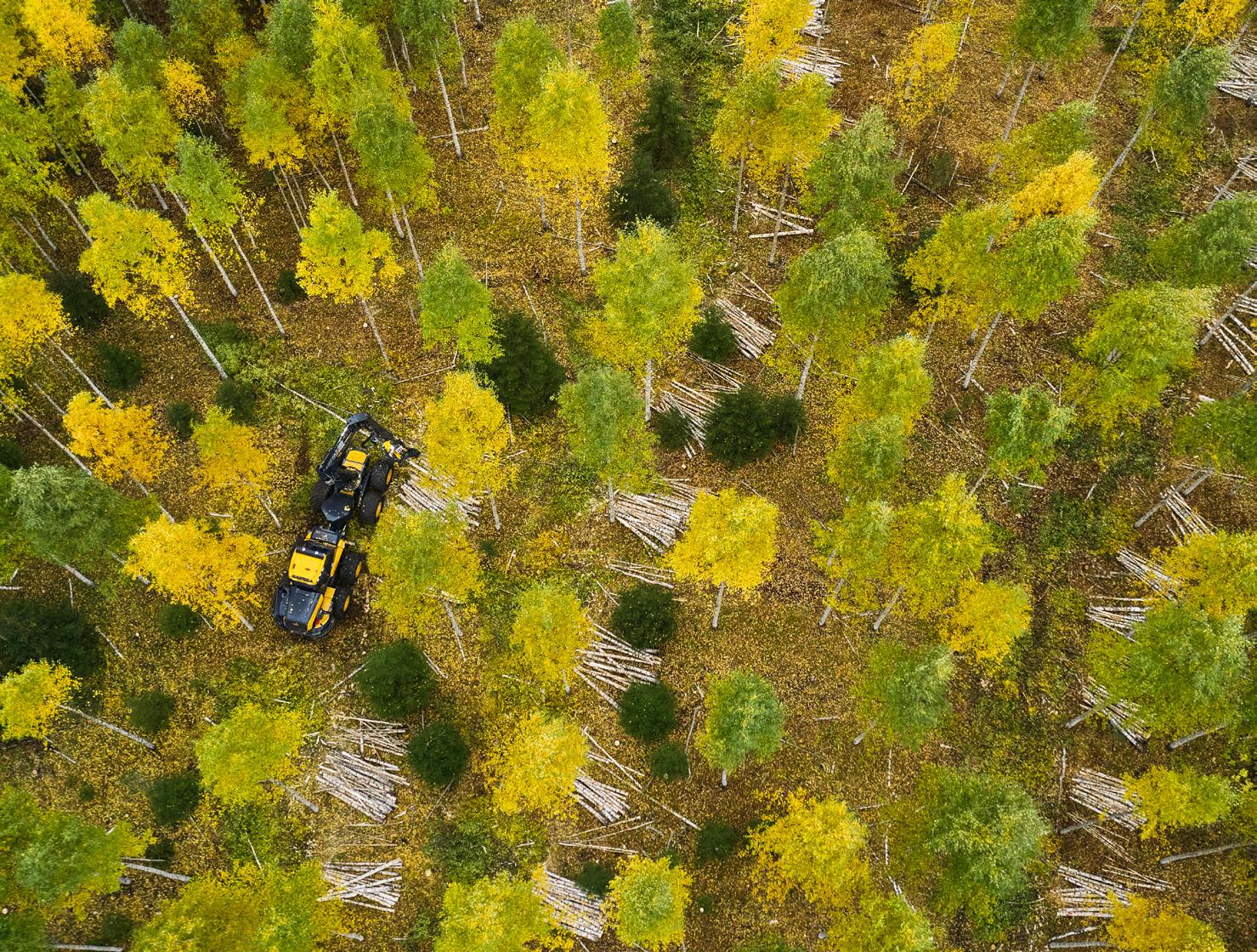
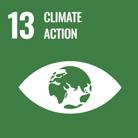
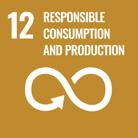


We innovate sustainable solutions that respect nature
We develop our operations while respecting nature
01
01 Environmental responsibility 02 Social responsibility 03 Governance

We innovate sustainable solutions that respect nature
Our product and service solutions enable sustainable forestry. We bear responsibility for the machine life cycle and extend it through excellent maintenance services. We develop solutions that promote the circular economy and reduce the environmental impacts of machines.
We develop our operations while respecting nature
We know the environmental impacts of our operations and work systematically to improve them. We seek carbon neutrality and material efficiency in our products and operations.
Ponsse’s operations in Finland comply with the ISO 14001 standard for environmental management.
Environmental responsibility
17 01
OUR PRINCIPLES
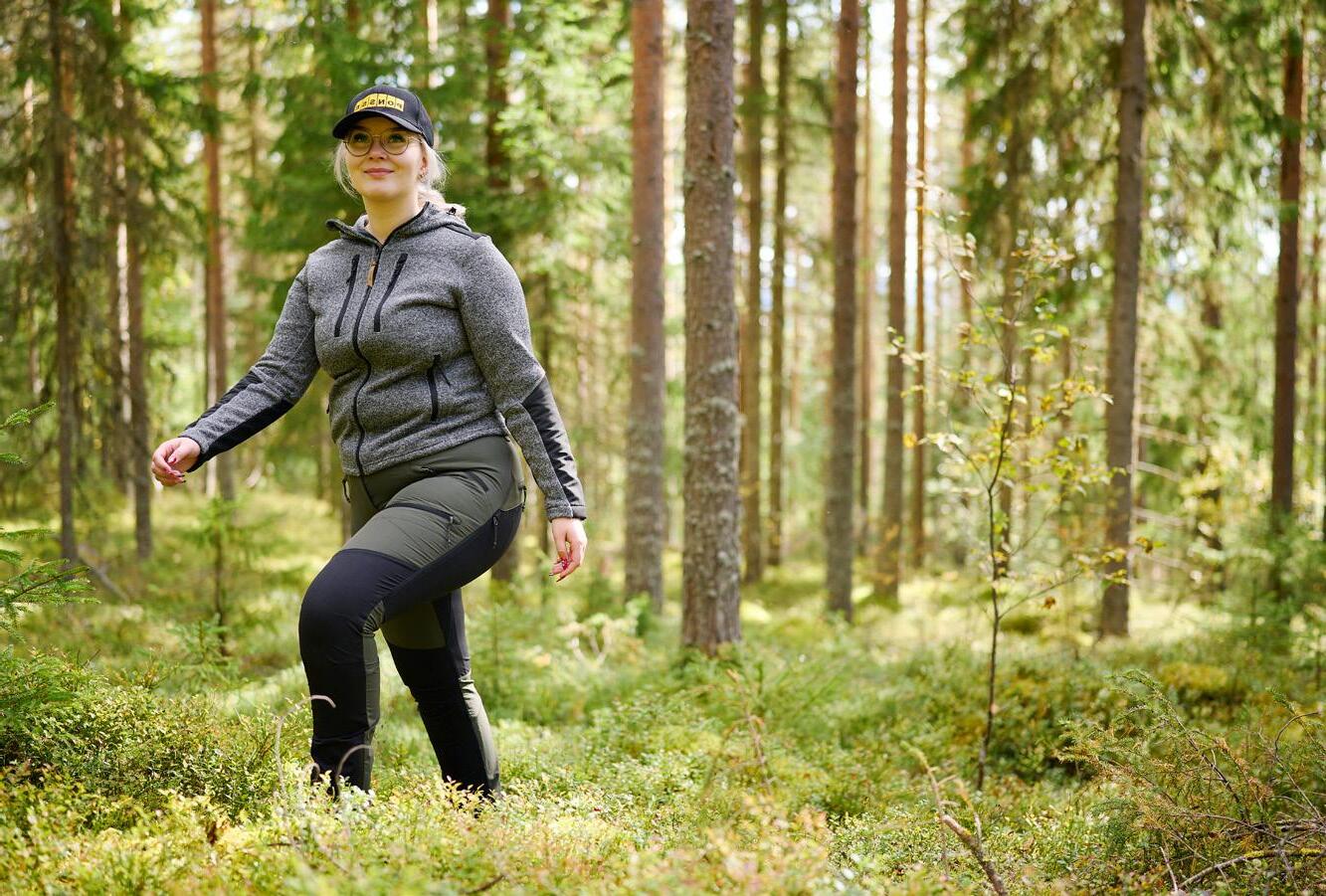
Towards carbon neutrality
At Ponsse, the carbon neutrality target means that we strive towards zero emissions from our products and operations through our own operations and product development. We will review the need and role of carbon offsetting as our climate programme progresses. Our emissions reduction targets cover our Scope 1 and 2 emissions (own operations and purchased energy).
18 01 01 Environmental responsibility 02 Social responsibility 03 Governance
ENVIRONMENTAL RESPONSIBILITY IN PRACTICE
Emission target 01
Carbon-neutral factory by 2025 (Scope 1 & 2)
A carbon-neutral factory refers to our production operations within the factory, and the goal does not take into account the use of vehicles, the test drive process or the equipment used for deliveries. In addition to manufacturing forest machines, Ponsse has production operations at Epec Oy in Seinäjoki, which produces electronics and control systems for mobile machines.
In 2023, the carbon footprint of Ponsse Group’s factories increased by 30% to 337 tCO2e from the previous year. The increase resulted from refrigerant leaks in Epec Oy’s previous production facilities, as even small volumes cause a large impact because of high emission factors. Considering our goal, the most significant part of emissions comes from the use of liquefied petroleum gas as a surface treatment fuel in Vieremä, and we will replace it with a renewable fuel during this year.
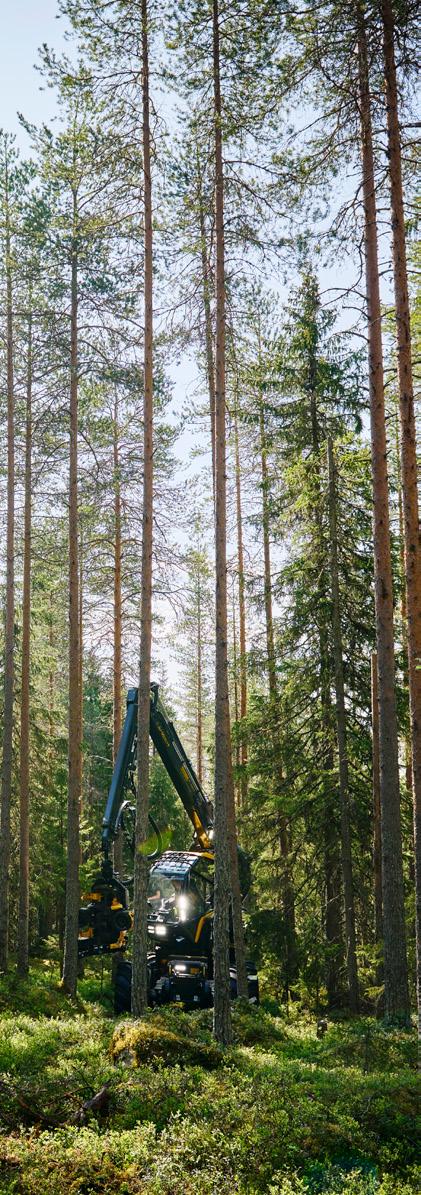
01
2,605 2500 2000 1500 1000 500 0 2019 409 2020 270 2021 259 337 Target: 0 2022 2023 2025
Carbon footprint of the factory, tCO2e Environmental responsibility

Carbon neutrality in the Nordic countries by 2035 (Scope 1 & 2)
In addition to production operations, the goal covers the use of vehicles, the equipment used for deliveries and maintenance services in the Nordic countries. Besides Finland, Ponsse operates in the Nordic countries through its subsidiaries in Sweden and Norway.
In 2023, our carbon footprint in the Nordic countries increased by 7% to 2,070 tCO2e. The increase resulted from the increased use of vehicles
in operations in Finland and the significant decrease in the proportion of bio content of fuel mixtures sold in Finland compared with the previous year. During the year, we purchased 14 new hybrid and electric vehicles in the Nordic countries, mainly in Sweden. We switched to renewable guarantee-of-origin district heating in six locations in Finland at the end of 2023. The full impact of this switch cannot be seen until next year’s emissions calculation.
01
Emission target 02 5,082 5000 4000 3000 2000 1000 0 2019 2,046 2020 2,082 2021 1,931 2,070 Target: 0 2022 2023 2035
01 Environmental responsibility 02 Social responsibility 03 Governance
Carbon footprint, Nordic Countries, tCO2-e
The Group’s carbon footprint down by 55% by 2035 (Scope 1 & 2)
The baseline year is 2022. Reaching the goal means annual emission reductions of around 5%.
The target covers the entire Group, including all our subsidiaries.
In 2023, Ponsse Group’s carbon footprint increased by 6% to 4,499 tCO2e. This increase
from the previous year can be explained by the increased use of vehicles, combined with the significant decrease in the proportion of bio content of fuel mixtures. For example, the proportion of bio content of diesel used in Finland dropped by ten percentage. Our goal is to define a vehicle policy for the Group during 2024 to reduce emissions from the use of vehicles.
5%
Our annual emissions reduction goal

01
Emission target 03
6,951 5000 6000 7000 4000 3000 2000 1000 0 2019 3,571 2020 4,365 2021 4,310 4,499 Target: -55% from 2022 2022 2023 2035
Environmental responsibility
Ponsse’s carbon footprint, tCO2e
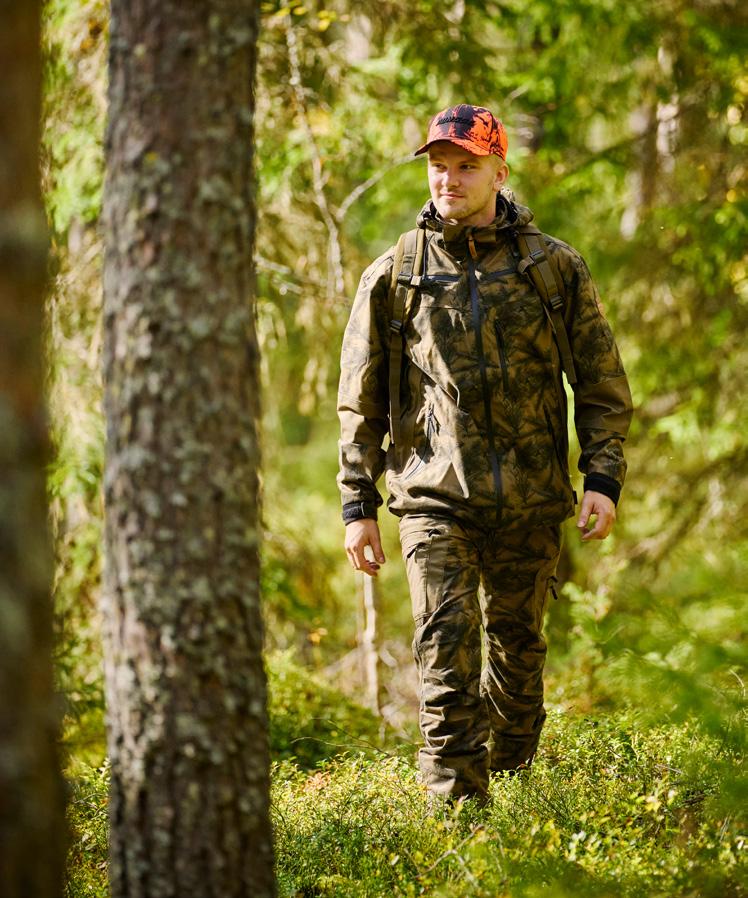
We have used 2019 as the baseline for our emissions calculations, as the company started to calculate the Group’s emissions during that year. Ponsse’s carbon footprint in 2019 was 6,951 tCO2e, of which 3,277 tCO2e (47%) came from Scope 1 emissions and 3,674 tCO2e (53%) came from market-based Scope 2 emissions. The emission intensity in the first year of calculation was 12.4 tCO2e/M€. The biogenic emissions from our own operations and purchased energy were 3,185 tCO2e. We recalculated the baseline emissions in 2022 because of the sale of our Russian subsidiary and the establishment of new subsidiaries in the Czech Republic and Chile.
In 2023, our Scope 1 and 2 (own operations and purchased energy) carbon footprint was 4,499 tCO2e. Compared with the previous year, the carbon footprint increased by 6% (245 tCO2e). The increase was caused by Scope 1 emissions as the use of vehicles increased and the proportion of bio content of fuel mixtures decreased from the previous year. Refrigerant leaks in Finnish operations were another significant source of emissions that caused our carbon footprint to increase. Although our total carbon footprint increased, emissions from purchased energy decreased by 15% as the share of renewable district heating increased. Our carbon footprint was 35% lower than in the base year (2019).
22 01
ENVIRONMENTAL RESPONSIBILITY IN PRACTICE 01 Environmental responsibility 02 Social responsibility 03 Governance
Most of our carbon footprint, almost 90%, came from our own operations. The most significant proportion of the emissions came from the use of the company’s own vehicles, followed by the test drive of manufactured machines and the use of work machines, and heating. Geographically, nearly half of our carbon footprint was generated by operations in Northern Europe. Large emissions were also generated by our operations in North and South America.
Compared with the previous year, our subsidiaries’ carbon footprint fell most in China (-30%), Ireland (-26%) and Sweden (-23%). Our subsidiaries in France, the United States and Norway also managed to reduce their emissions by a few per cent. However, the impact on the carbon footprint of whole the Group remained small, as the emissions from these subsidiaries are relatively small, and the emissions from other operations increased significantly more than this.
23 01
Carbon footprint by business area, tCO2e
North Europe 2,854 (63%) Vehicles 595 (13%) Test drives and work machines 397 (9%) Other use of fuel 116 (3%) Refrigerant leaks 165 (4%) Electricity 372 (8%) Heat 468 (10%) Central and Southern Europe 51 (1%) Asia 1,024 (23%) North America 885 (20%) South America Environmental responsibility
Carbon footprint by emission source, tCO2e
2,070 (46%)
Calculation of value chain emissions
So far, we have only calculated emissions from our own operations and purchased energy (Scope 1 & 2). Currently, we are collecting information from 2023 for our first value chain (Scope 3) emission calculation. We have identified key emissions categories in our operations and defined data collection and reporting policies for them. The first calculation will cover all categories significant for the company at Group level, including subsidiaries. The calculation results will be completed by mid-2024.
Even though the first Scope 3 calculation is still in progress, we have already taken measures to reduce emissions in our value chain in the future. In 2023, we signed a cooperation agreement with the steel company SSAB on the gradual start of the delivery of fossil-free steel from 2026. This would reduce emissions from purchased raw materials and products. In 2022, we launched the electric PONSSE EV1 forwarder concept, and its new technologies represent an important step towards zero-emission harvesting.

For the first time, we also calculated Scope 2 emissions using the location-based method, which describes how much the emissions of purchased energy would be if we used the energy produced by the average production sources in the local power grid. Market-based calculation takes account of energy purchase agreements and purchased emission-free and renewable energy products. For this reason, the market-based figure is markedly lower than the location-based figure.
For the first time, we also calculated Scope 2 emissions using the locationbased method.
24 01
ENVIRONMENTAL RESPONSIBILITY IN PRACTICE 01 Environmental responsibility 02 Social responsibility 03 Governance
Scope 1
Scope 2 (market-based)
Scope 2 (location-based)
Total carbon footprint (market-based)

The emissions data is based on information available at the time of signing the financial statements and may be updated later. The calculation of our emissions is based on the Corporate Standard of the international GHG (Greenhouse Gas) Protocol. Our calculation uses the operational control method and covers six greenhouse gases: CO2, CH4, N2O, HFC, PFC and SF6. We use 100-year global warming potential (GWP) factors in accordance with the IPPC’s sixth report (AR6). The only other significant climate emissions from our operations are volatile organic compounds (VOCs) from surface treatment, the amounts of which have been obtained from our chemical suppliers.
Environmental responsibility
01
2023 Carbon footprint, tCO2e Emission intensity, tCO2e/M€ Biogenic emissions, tCO2e Other emissions to air, t
Change, % 2022 2021
Emissions to air
footprint relative
sales Total biogenic emissions Volatile organic compounds (VOC) 3,961.8 536.7 7,792.6 4,498.5 3,625.0 628.84,309.9 3,653.4 711.34,364.7 +9% -15%+6% 5.5 5.7 7.2 -4% 3,842.7 2,468.5 2,775.8 +56% 8.8 9.9 15.3 -11%
Carbon
to net
Climate action in our operations

We increased the number of hybrid and electric vehicles in the Nordic countries. During the year, we acquired 13 hybrid vehicles and one fully electric vehicle, which were mainly passenger cars with the exception of one hybrid van. Most of the vehicle purchases were made at our Swedish subsidiary Ponsse AB, where already 40% of the vehicles are hybrid or electric. At Group level, we have 30 electric and hybrid vehicles, which is only 6% of all our vehicles. However, we are seeking to increase the purchase of lowemission vehicles when replacing old ones.
We will also replace fuel-powered machinery with electric with new purchases. For example, our French subsidiary, Ponssé S.A.S., replaced three work machines with electric machines in 2023. We have identified the use of vehicles and machinery as a significant source of emissions from our operations. To reduce these emissions, our goal is to define a Group’s vehicle policy during 2024.
We switched to guarantee-of-origin renewable district heat in three of our locations in Finland at the beginning of 2023. In addition, three sites switched to renewable district heat towards the end of the year, the impacts of which will not be visible until the emissions calculation for year 2024. Going forward, we aim to replace district heat with renewable one in our other locations in Finland as it becomes available.
26
01
03 01 Environmental responsibility 02 Social responsibility 03 Governance
01 02

At our Vieremä factory, we installed charging points for electric cars for employees, visitors and the company’s own vehicles. With this, we want to encourage our employees towards low-emission motoring and enable the use of Ponsse’s own electric and hybrid vehicles. We will also add electric charging points to other locations in the coming year. Employees of the Vieremä factory also have the opportunity to use shared transport arranged by the local ELY Centre for commuting between Iisalmi and Vieremä.
We prepared for a possible replacement of the paint shop fuel by carrying out a technical study on the replacement of liquefied petroleum gas with a renewable fuel. Our intention is to replace the LPG we use in surface treatment with a renewable fuel in the coming year. One option is the biogas plant that was built next to our Vieremä factory in 2023, which also supplies compressed biogas for industrial use.
We are continuously working to increase the accuracy of the primary data used in our calculations. During 2024, we will further specify the amount of fuel used in the test drive process. Detailed data collection is possible with the help of the computer systems in forest machines.
27 01
06 Environmental responsibility
04 05
Energy target 01
Proportion of carbon neutral energy 95% by 2030
Carbon-neutral energy means energy generated using renewable energy sources and nuclear power. The target covers the entire amount of electricity and heat used in the Ponsse Group, including heat produced using fuels.
In 2023, the proportion of carbon neutral energy of all electricity and heat consumed increased
to 91.5%, up by 2.2 percentage from the previous year. This largely resulted from the increase in the use of renewable heat. During the year, we switched to renewable guarantee-of-origin district heating in six locations in Finland. The full impact of the change will not be seen until next year, as some of the changes were made towards the end of the year.
28 01
2019 75.7% 83.1% 87.5% 89.3% 91.5% 95.0% 2020 2021 2022 2023 2030 Energy target 50% 60% 70% 80% 90% 100% Carbon-neutral energy, % 01 Environmental responsibility 02 Social responsibility 03 Governance
Energy consumption
Our total energy consumption, including fuels, increased by 1%. Renewable energy accounted for only 32% of the total energy consumed, decreasing significantly from the previous year, as we switched from renewable electricity to guarantee-of-origin nuclear electricity in Finland for cost reasons. The share of carbon-neutral energy of the total energy consumed increased slightly to 58%.
A third of the energy we consumed was electricity, of which up to 97% came from emission-free energy sources. The electricity consumed in our Finnish locations was produced using 100% guarantee-of-origin emission-free nuclear power. The smallest proportion of our energy consumption consisted of district heating, of which 93% was produced using renewable energy sources. Of the electricity and district heat we purchased in the entire Group, 62% had guarantees of origin.
Solar panels in our operations in Finland and Uruguay generated 179 MWh of electricity, the majority of which was consumed in our own operations, while a total of 16 MWh was sold. The volume of self-produced electricity increased by 3% from the previous year. During 2023, we installed solar panels in six locations in Finland and at Epec Oy’s factory, which building was
completed at the end of the year. The total impact of the solar power plants will be seen next year. The annual production expectation is 294 MWh in our locations in Finland and 210 MWh for Epec’s factory, meaning that our own electricity production should triple from the current level.
Fuel consumption
Around 50% of our energy consumption came from the use of fuels. Only 16% (2.9 GWh) of the fuel volume came from renewable sources, including the bio fractions contained in fuel mixtures. The company used fuel for vehicles, the test drives of manufactured machines, the surface treatment process, work machines and heating, among other purposes. Of the heat we used, 1.3 GWh was produced using fuels: oil, natural gas and wood chips. We consumed 1.5 GWh of wholly renewable fuels, of which hydrotreated vegetable oil (HVO) diesel was used in work machines, as the first tank of fuel in manufactured forest machines, and in the test drives of manufactured machines. Our subsidiary in Brazil used ethanol as fuel for passenger cars. Our subsidiary in Norway used bio-oil for heating, and our subsidiary in the Czech Republic used wood chips.
29 01
Environmental responsibility
Energy-saving measures
Our most significant single energy action was Epec Oy’s new, energy-efficient electronics factory, which was completed in Seinäjoki at the end of 2023. In addition to a 210 MWh solar power plant, the factory has a geothermal heating system and heat recovery with needle heat exchangers. During the year, measures to save energy were carried out in our operations in Finland in particular. In several locations, we switched lighting to LED lights and achieved energy savings through technical changes in the use of ventilation and heating. Through these measures, we achieved energy savings of 1,005 MWh, of which 789 MWh came from heat and 216 MWh from electricity. We have not received savings calculations from our suppliers for some of the energy-saving measures taken. These include, for example, a hybrid filter installed in a factory’s main distribution board to stabilise voltage, cut
excess load and clean the quality of electricity. This technology is expected to reduce electricity consumption by around 3–6%.
In our Finnish operations, an energy audit and a site review in accordance with the Energy Efficiency Act was carried out in our Jyväskylä location. The aim of an energy audit is to examine and analyse energy use and energy saving opportunities on the site and to present possible savings measures, along with profitability calculations. An energy audit must be conducted at least every four years.
We also participated in Motiva’s Energy Saving Week, during which we increased communication to our employees about energy consumption and the energy saving measures carried out. In addition, we participated in Motiva’s Down a Degree campaign, which aims to encourage Finnish people to take concrete action to save energy.
30 01
01 Environmental responsibility 02 Social responsibility 03 Governance
Energy
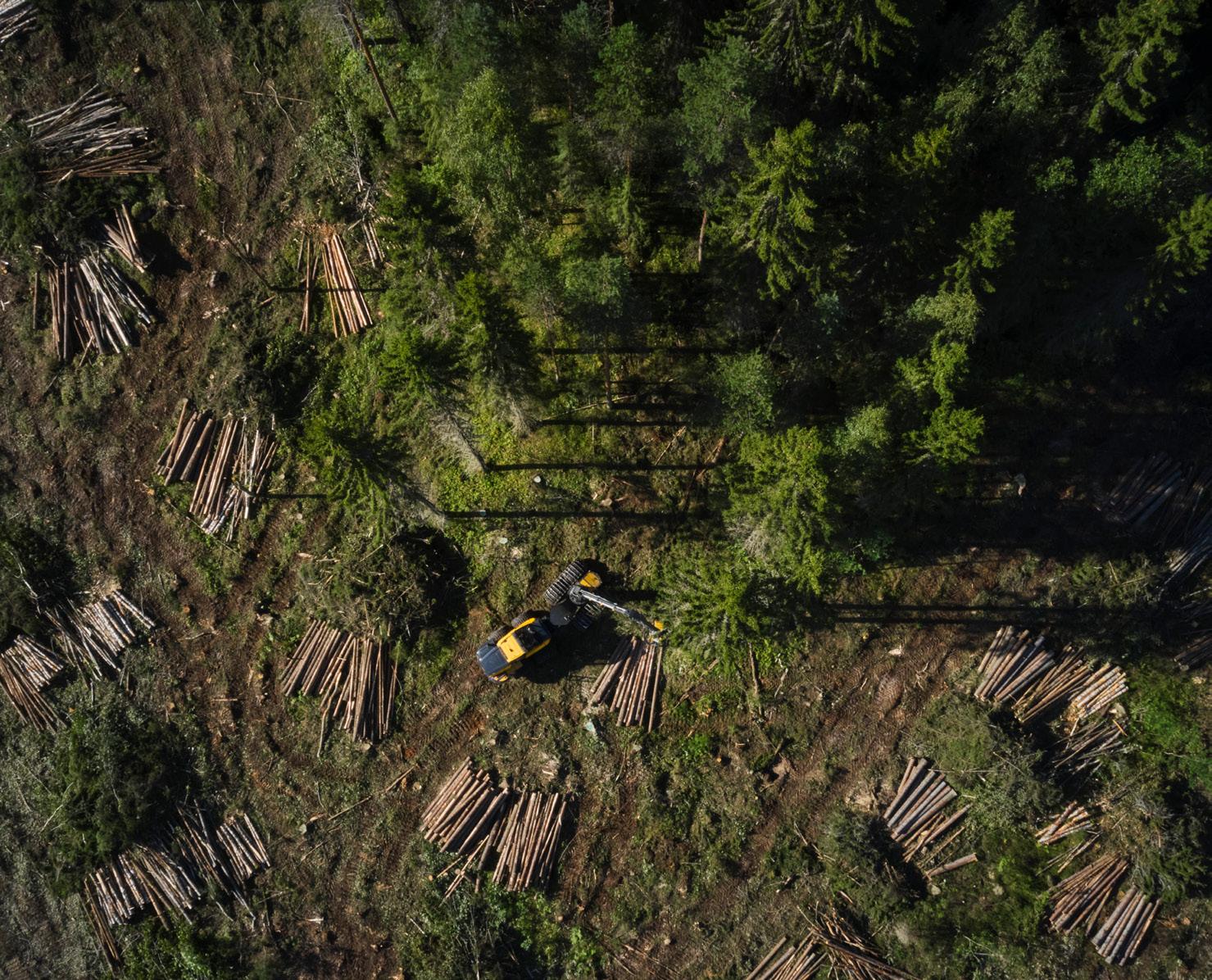
*The change rate has been calculated from unrounded figures.
Environmental responsibility
The energy information has been calculated mainly based on reported consumption. Statistics Finland’s conversion factors have been used in the calculation of energy figures. We do not use district cooling or steam in our operations, and we have not sold any other energy besides electricity.
01
Fossil fuels Petrol Diesel Kerosene Natural gas Liquefied petroleum gas Fuel oil Renewable fuels Ethanol Wood chips Renewable diesel (HVO) Renewable fuel oil Total energy from fuels Purchased electricity Self-generated electricity Sold electricity Purchased district heating Total electricity and heat Total energy consumption Energy intensity, MWh/M€ Total energy consumption relative to net sales 16.9 2.3 10.8 0.0003 0.8 1.0 2.0 1.5 0.3 0.3 0.9 0.1 18.5 12.5 0.2 –0.02 8.4 21.1 39.6 48.2 17.3 2.4 10.91.0 1.0 2.1 1.6 0.1 0.4 1.0 0.1 18.9 12.7 0.2 –0.02 7.2 20.1 39.0 51.6 16.2 2.5 9.51.0 1.0 2.2 1.4 0.31.1 0.1 17.5 12.1 0.2 –0.02 8.3 20.6 39.0 62.8 –2% –1%-21% +3% –6% –6% +117% –24% –14% –2% –2% –2% +3% +17% +16% +5% +1% –7% 2023 Energy consumption, GWh Change %* 2022 2021
Waste and water
Of our total waste volume, 75% is generated in Finland: 46% in the Vieremä factory and 29% in service operations. During 2023, we set our first goals for waste generated in our operations.
Waste target 01
Increasing the recycling rate to 70% by 2030
The recycling rate indicates how much of the waste generated in the operation ends up being reused as such, recycled for recovery as material, or composted or digested.
In 2023, our waste recycling rate was 51.3% of the total amount of waste. The recycling rate fell by less than 1% from the previous year. We have identified the need to develop the recycling of separate recyclable waste fractions in several of our locations. For example, we should collect significantly more plastic than we currently do.
32 01
Recycling rate, %
60 % 70 % 80 % 50 % 40 % 40 % 30 % 20 % 2022 2023 Target 70% 2030 52.2% 51.3% ENVIRONMENTAL RESPONSIBILITY IN PRACTICE 01 Environmental responsibility 02 Social responsibility 03 Governance
During 2023, we further specified the waste data of our operations and, for the first time, obtained waste volumes from all our own locations.
Target: -40 % compared to 2023
The baseline year is 2023. The goal has been set to support increasing the recycling rate so that we can better collect materials that are suitable for recycling.
In 2023, Ponsse’s volume of mixed and energy waste was 792 tonnes. The number increased significantly from the previous year, which is explained by the fact that the waste data for 2022 was insufficient. During 2023, we further specified the waste data of our operations and, for the first time, obtained waste volumes from all our own locations.
33
Waste target 02 Mixed and energy waste volume, t Reducing the total volume of mixed and energy waste by 40% by 2030
01
900 600 300 0 2022 2023 2030 478 792
Environmental responsibility
668 t 1,524 t 323 t
was prepared for reuse
was recycled to be reused as material ended up in landfilling 01
was recovered other ways was disposed of in other ways 01 Environmental responsibility 02 Social responsibility 03 Governance
965 t 589 t 219 t
The obligation to increase the recycling rate and reduce the amount of waste applies to the entire Group and all operations, but the most significant changes must be achieved in our operations in Finland. To achieve the objectives, we will draw up a new waste programme for our operations. In addition, we must promote the further specification of waste data, reporting and monitoring, as well as communication related to recycling.
Waste recycling
Our total waste volume increased by 10% from the previous year. The main reason for this was the fact that more accurate waste data was available on our operations. In 2022, we collected waste data on our operations for the first time, and the data was partly incomplete. The volume of waste in 2023 describes our normal situation better than the figures for 2022.
34
In 2023, of the total waste volume: was incinerated
The waste data is mainly based on information got from waste companies. Other recovery operations include waste transfer and pre-treatment prior to recovery, while other disposal operations include, for example, physico-chemical treatment of oily soil. All our waste is handled by a third party outside our administrative control.

Environmental responsibility
Non-hazardous waste Preparation for reuse For recycling Other recovery For waste incineration For landfilling Other disposal Hazardous waste For recycling Other recovery For waste incineration For landfilling Other disposal Total waste volume 3,240 668 972 304 732 475 88 1037 571 9 233 114 111 4,277 +6% -6% -2% -2% -8% +153% +24% +28% +79%-18% -39% +443% +10% 3069 711 993 311 794 188 71 809 318282 188 20 3,878 2023 Change, % 2022 Waste volume, t
01
Waste
Most of the waste generated by our operations was wood, and the second largest proportion consisted of hazardous waste. The large amount of hazardous waste is explained by components and substances that are removed from machines to be refurbished, such as used oils and coolants, lead batteries, hydraulic hoses and oil filters. Maintenance also generates oily soil and sludge from oil separation wells in connection with washes.
Ponsse’s recycling rate is increased by recyclable wood packaging, pallets and collars used in the factory, which are reused several times before being delivered for incineration. In 2023, a total of 668 tonnes of wood packaging was sent for reuse. Another example is used waste oil collected from operations. A total of 442 tonnes of waste oil was recycled into new oil products.
Waste generated, t
In 2023, a total of 668 tonnes of wood packaging was sent for reuse.
Hazardous waste, tonnes
36 01
(24%) Hazardous waste 490 Waste oil
(19%) Mixed & energy waste 155 Other liquid waste 693 (16%) Metal 174 Oily soil & sludge 1,358 (32%) Wood 141 Solid oily waste 244 (6%) Cardboard, paper & plastic 36 Lead batteries 112 (3%) Grit separation & rainwater gully sludge 10 Electronic waste 40 (1%) Other (bio-waste, construction waste and glass waste) 31 Other hazardous waste
1,037
792
01 Environmental responsibility 02 Social responsibility 03 Governance
Water use
Our water withdrawal increased by 5% from the previous year. Most of the water we use is taken from the municipal water network, in addition to which groundwater is taken from wells in our operations in Uruguay and Chile. Of our water intake, 4% came from water stress areas and consisted entirely of groundwater. One of our sites, our Chilean subsidiary, is located in a highrisk water stress area.
We mainly use water in our operations for washing forest machines and for sanitation purposes. The Vieremä factory consumed nearly 50% of the total water volume. Its water
consumption was 13,086 m3, with a decrease of 18% from the previous year. After test driving machines, we wash them before they are delivered to customers. This prevents the spread of invasive species through exports, for example. In production, we use water to wash components for surface treatment. In surface treatment, we minimise water consumption by recycling the water several times, but we do not measure the volume of water recycled. Water is not absorbed by our products. The water we use ends up in treatment by a third party through the municipal wastewater network.
Water
We have used the WWF Water Risk Filter tool to identify water stress areas. A location is classified as being in a water stress area if it has a risk score ≥ 3. We do not measure the amount of wastewater in our operations.
37 2023 2022 2021 Change, % Water withdrawal, 1,000 m³
Total water withdrawal Groundwater Third-party (municipal) Total water withdrawal from water stress areas 31.1 2.3 28.9 1.2 +5% -8% +6% +15% 29.7 2.5 27.2 1.1 31.8 1.2 30.6 0 01
Environmental responsibility
External reports
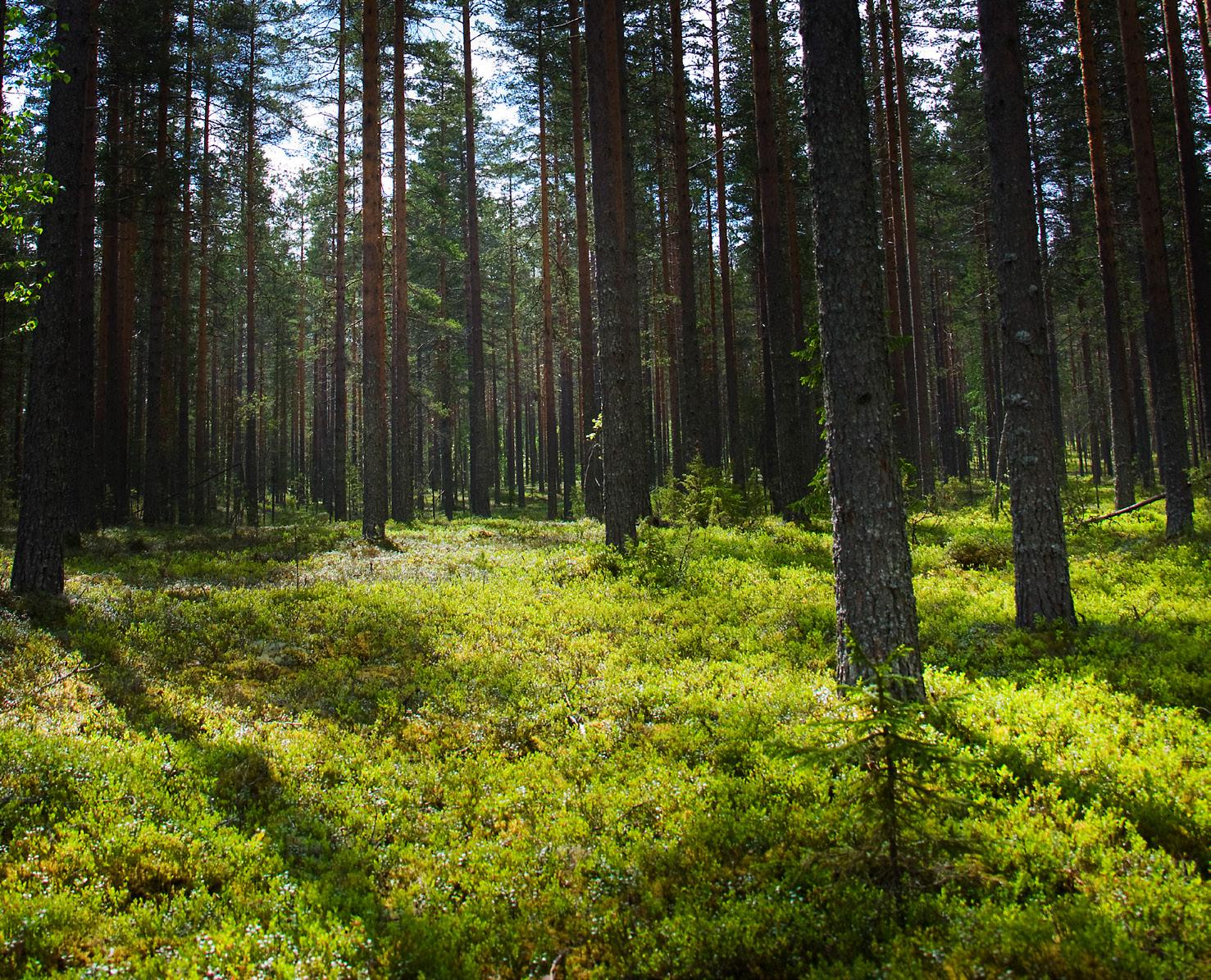
In 2023, we participated for the fourth time in reporting the climate change survey of the Carbon Disclosure Project (CDP). Our score was C, which on the reporting scale stands for awareness of our climate impact and the impact of the climate on our operations. The score matches the industry average, while being lower than Europe’s regional average (B). Our climate work is in its early stages, and we still have room for improvement in calculating the emissions of our value chain, among other aspects.
In addition to climate reporting, we got to respond to CDP’s water security reporting for the first time. Our score was C-, which means that we are aware of our water-related impacts and water-related issues. The result was slightly lower than the industry average and regional average for Europe (C). We recognise that we have left water-related issues a lower priority in our environmental work. Our goal is to further specify the impacts of our operations on water.
01
01 Environmental responsibility 02 Social responsibility 03 Governance
ENVIRONMENTAL
RESPONSIBILITY IN PRACTICE
Environmental impacts of procurement and logistics
Key goals of procurement include the efficient circulation of stocks and the optimal availability of materials. This helps us keep our stock levels and needs for facilities and resources moderate and avoid material waste. The most significant environmental impact of our procurement and logistics is associated with steel manufacturing for PONSSE forest machines and the transport of components. Steel and castings combined make up a significant part (82%) of the weight of forest machines. We calculate and dimension machine structures in our research and development operations by optimising the use of steel and castings based on product loads. Forest machines have a recycling rate of 97%.
Risk management
We have kept our environmental impacts and other procurement risks under management by centralising our procurement in Europe and especially in Finland. Of Ponsse’s direct material suppliers and subcontractors, 73% are located in Finland (2022: 74%) and 24% in other EU states (2022: 23%). Ponsse has no significant direct sourcing from low-cost countries. In addition to Finland, the most technologically challenging and expensive components for PONSSE forest machines are sourced from Germany and Sweden.
39 01
Environmental responsibility ENVIRONMENTAL RESPONSIBILITY IN PRACTICE
Environmental impact of transport
A total of 47% of our subcontracted purchases (EUR) and 21% of all our procurement (subcontracting and purchased components) take place within 25 kilometres of our production facilities. Our subcontractors are mainly located in the partnership business park in the immediate vicinity of our factory in Vieremä. This significantly reduces transport emissions and enables joint transport operations between our production and our subcontractors.
We seek to control the environmental impacts of transport by improving the efficiency of transport operations and developing packaging solutions. As many as 90% of our transport partners report their carbon footprint to us, allowing us to prepare for expanding our emissions reporting to Scope 3 emissions.
Recycling of packaging materials
With our largest domestic suppliers, we recycle packaging between the supplier and Ponsse. Packaging design, recycled packaging and transportation stands designed for PONSSE components have reduced not only the use of packaging materials, but also damage to parts. Furthermore, they have improved the transport efficiency rate. To enhance return logistics, recycled packaging for large products can be folded.
We mainly use standard reusable pallets in our deliveries and transfer disposable pallets for chipping and further for the generation of district heating in Vieremä. Otherwise, we see to our producer liability by delivering our production packaging to a recycling partner, which forwards the material for recycling or use as energy.
With our largest domestic suppliers, we recycle packaging between the supplier and Ponsse.
40 01
01 Environmental responsibility 02 Social responsibility 03 Governance
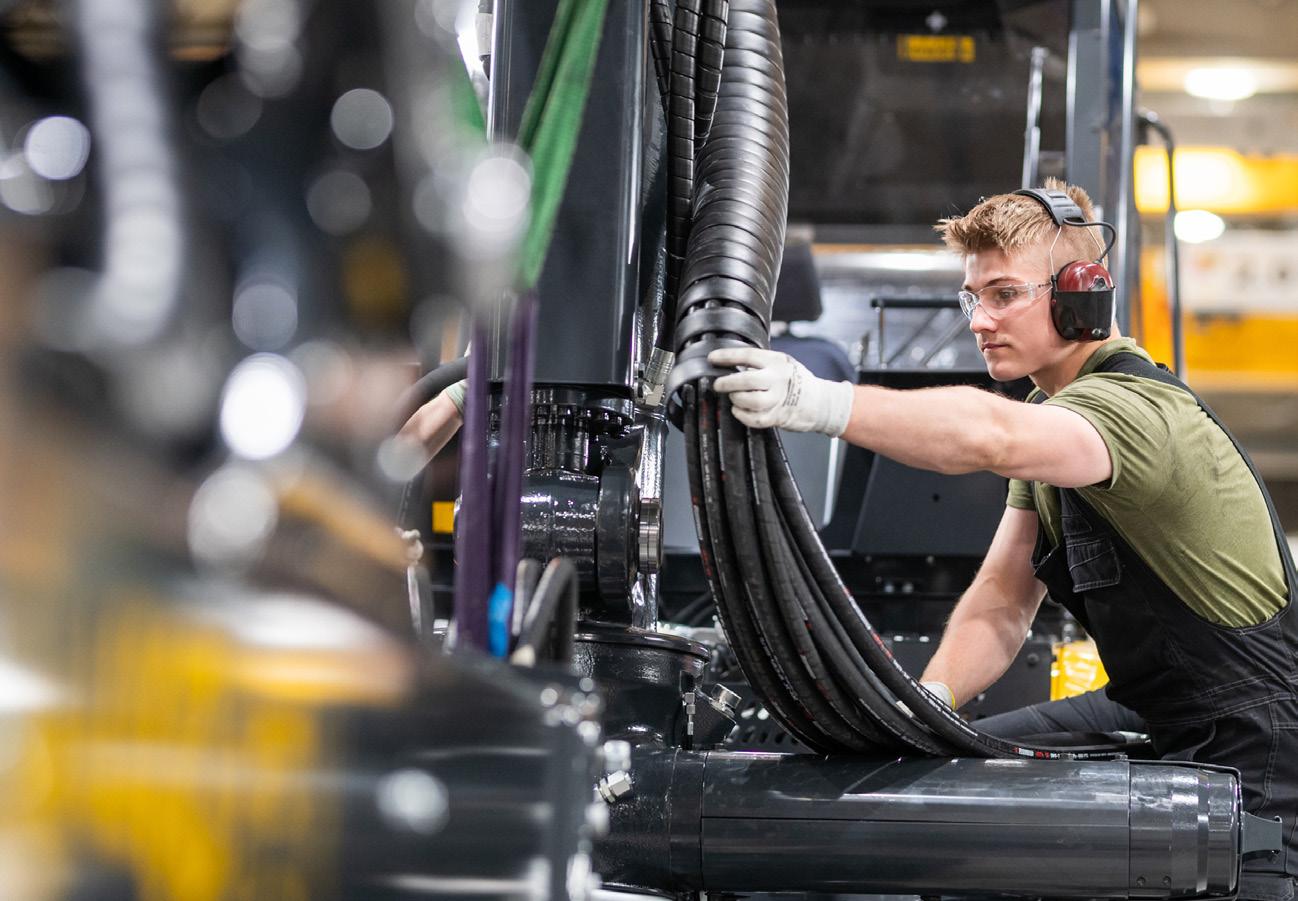
REACH and conflict minerals regulations
We collect information about our supplier network in accordance with the REACH Regulation (Registration, Evaluation, Authorisation and Restriction of Chemicals) and the conflict minerals regulations. At the same time, we provide our supplier network with information about legal obligations, including the reporting of substances of very high concern (SVHC) to the European Chemicals Agency’s (ECHA) SCIP database. The responses received cover 80% of our suppliers.
Regulation (EU) 2017/821 of the European Parliament and of the Council laying down supply chain due diligence obligations for Union importers of tin, tantalum and tungsten, their ores, and gold originating from conflict-affected and high-risk areas (Conflict Minerals Regulation) and the Finnish legislation on conflict minerals (Government Proposal 203/2020) based on the EU regulation promote the responsible procurement of minerals and metals. The aim is to prevent the funding of armed groups through trade in minerals originating from conflict areas and violations of human rights related to the minerals industry.
The REACH Regulation guides the registration, evaluation, authorisation and restriction of chemicals hazardous to health or the environment. Its aim is to replace SVHCs with safer options.
41
01
Environmental responsibility
Environmental impacts of production
All PONSSE forest machines are made in Vieremä. The environmental impacts of our production come from energy and raw material consumption, the use of chemicals, and solvent emissions from surface treatment. Our operations have an environmental permit and a licence granted by the Finnish Safety and Chemicals Agency (Tukes) for the storage and handling of chemicals.
Energy consumption
The majority of the energy consumed in our factory is renewable. The electricity we purchased during the year was 100% guarantee-of-origin nuclear power, and we also produced 122 MWh of electricity using solar panels. The factory is heated through district heating, of which 99.81% was renewable in 2023, mainly generated using wood fuels. The factory’s production machinery is also operated using low-emission energy, either electricity or renewable diesel. The only fossil source of energy used in production is the liquefied petroleum gas (LPG) used at the paint shop. Of the energy consumed in production in
our factory, 93% has been generated using renewable or zero-emission sources.
We modernise our building systems in connection with all production technology and property investments to enable energy efficiency and a proactive approach to maintenance needs. During the year, 125 development measures arising from building automation were carried out in the factory. We switched lighting to more energyefficient LED lights in the Vieremä facilities and installed a hybrid filter in one of the main distribution boards that cleans the quality of electricity, cuts peak loads and saves electricity.
42 01
ENVIRONMENTAL RESPONSIBILITY IN PRACTICE 01 Environmental responsibility 02 Social responsibility 03 Governance
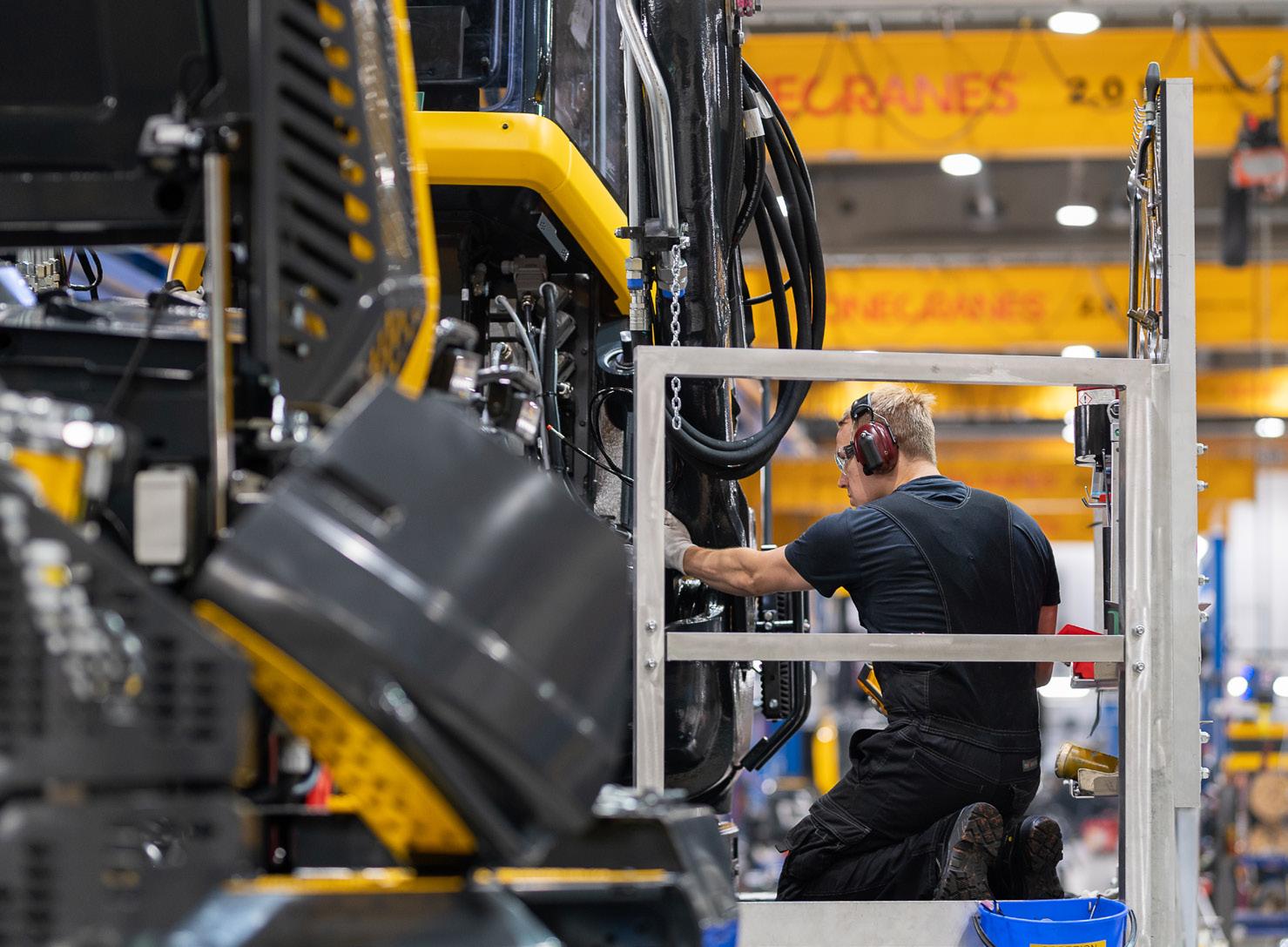
Waste recycling
We aim to minimise the generation of waste, mixed waste in particular. We sort all waste generated so that it can be optimally reused, recycled as material or used as energy. Currently, we can recycle all cardboard, paper, plastic and metal waste generated in our production.
When a new forest machine is completed on the production line, we fill it with light fuel oil or diesel in accordance with the requirements of the customer and the country of destination. In 2023, renewable diesel accounted for 24.1% (24%) of all fuel used as the first tank of fuel. Since the beginning of 2020, only diesel made from renewable raw materials has been used in machines completed on our production line. Currently, 75% of the fuel filled in machines is assumed to be consumed at Ponsse after the completion of the machine.
We are in the process of further specifying the information using fuel data from forestry machine computer systems, and the actual fuel consumption appears to be lower than our current estimate. According to the results of a life cycle assessment (LCA), if renewable diesel is used in a machine throughout its life cycle, the machine’s fossil carbon footprint will decrease by more than 90%. In 2023, a bio-based hydraulic oil was selected as the first tank of oil in 20.5% (18.3%) of our new machine deliveries.
01
responsibility
Environmental
Test drive process
Post-production machine testing generates emissions during transport and test drive operations through fuel and oil consumption. We use our own equipment to transport PONSSE forest machines completed in production for test drive operations to our customers in Finland and to the Iisalmi railway station for further exportation. Of our production, 75% is exported, and we transport all export machines to the port energyefficiently and with low emissions by rail.
Part of the test drive process for completed machines takes place in groundwater areas. Since 2022, we have participated in the revision of the groundwater area protection plan of YläSavon Vesi. At the same time, we have reviewed the risk management methods related to the environmental impacts of test drives.
We carry out test drive operations as assigned

by each forest company and comply with their harvesting instructions and Forest Stewardship Council (FSC) certification criteria in harvesting operations. The FSC criteria also require environmental impacts and values, including biodiversity, to be addressed in the processing of commercial forests.
We do not store any fuels in groundwater areas and always carry comprehensive oil leak response equipment with us during test drive operations. Test drive operations are preceded by production testing to ensure the functioning of the machine and the integrity of hose connections, among other aspects. To reduce the carbon footprint, we have replaced the diesel used in tested machines with biodiesel, while we still use fuel oil as the first tank of fuel in certain machines based on customer requests.
Ponsse’s technology company Epec Oy manufactures and develops machine control systems that lead the way towards zero-emission machines. Epec Smart Factory, a new factory completed in Seinäjoki at the end of 2023, seeks carbon neutrality in operations and uses sustainable manufacturing processes. Energy efficiency is improved by 600 solar panels (210 MWh per year), geothermal heating and heat recovery based on needle tube heat exchangers. The aluminium grating mounted on walls reduces the need for cooling energy. All electricity and heating energy come from renewable sources.
44 01
01 Environmental responsibility 02 Social responsibility 03 Governance
Environmental impact of products and services
We are committed to developing sustainable and innovative harvesting solutions. In accordance with our stakeholders’ expectations, environmental aspects have become significant guiding factors in R&D. The sustainability of our customers’ operations is also affected by our investments in minimising fuel consumption, emissions, and tree and soil damage, as well as in the continuous development of our maintenance service processes.
The emissions and environmental impacts of mobile work machines can be reduced significantly with new technological solutions. We are also exploring solutions in the FORWARD’27 programme, which aims to achieve significant emissions reductions, build long-term zero-emission solutions, reduce the energy consumption of machines and improve productivity. Improving the operator’s working conditions and ergonomics by means of assisting functions and automation is also key.
In 2023, new features were introduced in the PONSSE Opti 5G information system for PONSSE forest machines to make the operator’s work easier. The features can also be used to report forest insect damage, as the operator can add information to the felled tree trunk.
45 01
Environmental responsibility ENVIRONMENTAL RESPONSIBILITY IN PRACTICE
Life cycle emissions
We have identified the environmental impacts generated during the life cycle of Ponsse’s products and services using LCAs in accordance with the ISO 14040 standard. During the assessments, we have investigated the environmental impacts arising from the manufacturing and transport of machines, their use in different conditions, and machine maintenance. The majority of life cycle emissions contributing to global warming, roughly 95%, comes from the consumption of fuel in machines and the production of fuel. The highest transport emissions are associated with machine deliveries from the Vieremä factory to customers and the transport of machines between stands.
R&D continuously focuses on reducing the consumption of fuel. Fuel efficiency, meaning the consumption of fuel relative to the volume of wood harvested, is a key cost factor in harvesting, which is why our development work is guided by both financial and environmental factors. Our R&D enables PONSSE forest machines to be compatible with renewable fuels and biodegradable hydraulic oils.
Machine maintenance
During maintenance, the most significant environmental factors are the oils, tyres and spare parts used in machines. Ponsse’s authorised maintenance service network takes care of the appropriate handling of waste when machines are maintained by the authorised PONSSE maintenance network. The focus in our maintenance services is on preventive maintenance to avoid any unexpected breakage and carry out maintenance safely for the environment and mechanics. Regular machine maintenance and inspection included in maintenance agreements ensure that machines operate optimally and as planned. This also eliminates any unnecessary consumption of material and extends the machine life cycle. In 2023, the coverage of maintenance agreements was 47% in our new machine sales (2022: 37%).
46 01
01 Environmental responsibility 02 Social responsibility 03 Governance
Our R&D enables PONSSE forest machines to be compatible with renewable fuels and biodegradable hydraulic oils.
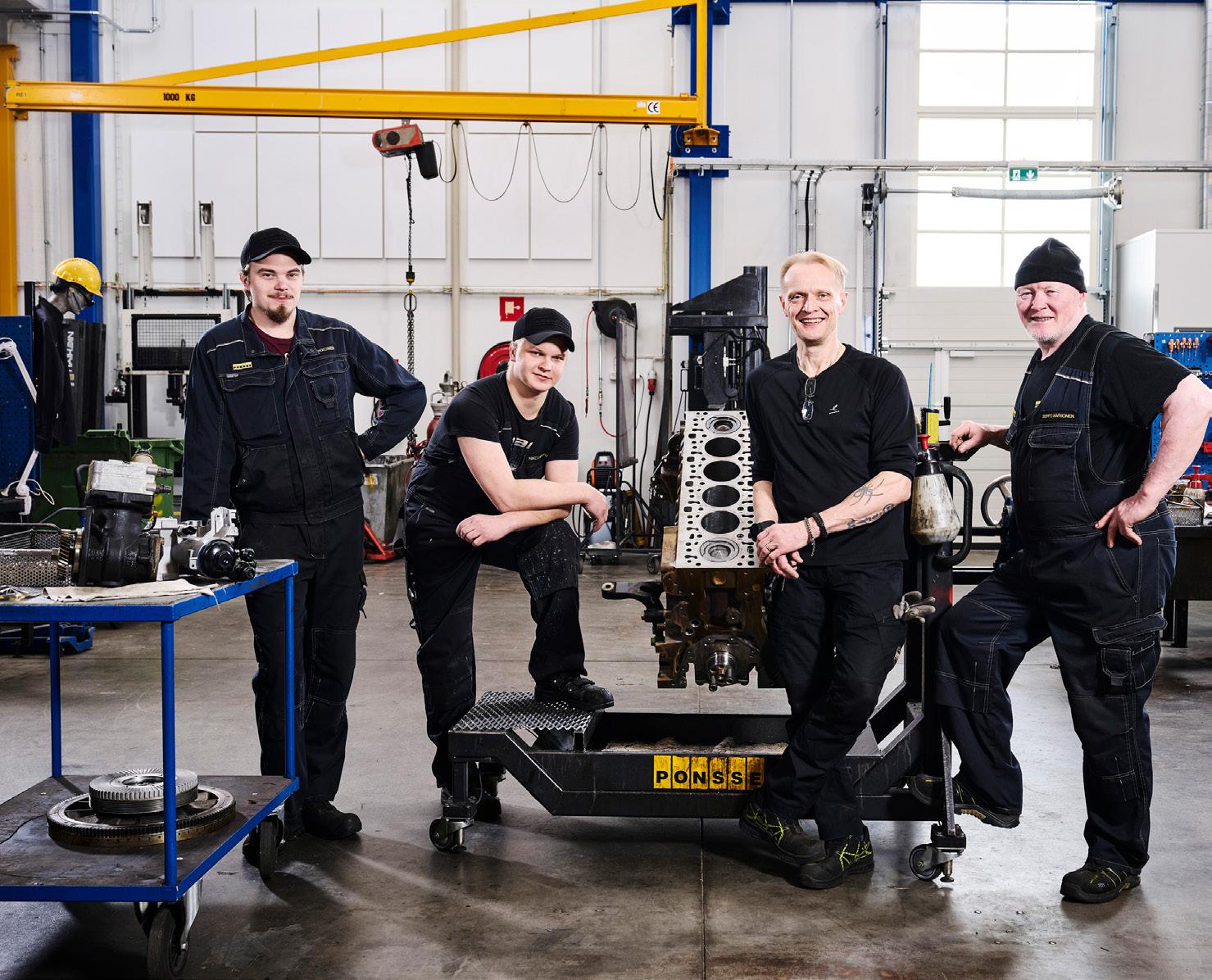
Environmental
01
responsibility
Cut-to-length logging
PONSSE forest machines use the cut-to-length (CTL) harvesting method. In 2023, we delivered CTL forest machines to 30 countries. Machines have been developed to utilise the highly valuable wood raw material and to have minimal damage to residual trees and soil on the logging site.

Nordic expertise and methods related to the sustainable use of forests offer a solution to minimise global forest loss, while renewable wood is required as a raw material to replace plastic and concrete. Regeneration methods and obligations in commercial forests, harvesting technologies and forest management methods play an important role when forest resources are required for carbon sequestration and as raw materials, not forgetting biodiversity in forests.
The advanced computing capacity of CTL forest machines allows the best possible value to be extracted from forests. This means more than financial gain. By optimising the yield and processing value of the raw material, the maximum amount of sawn timber with a long-term carbon sequestration capacity can be produced.
CTL machines support all harvesting methods from first thinning to continuous cover forestry
48 01
YOUR P A R T NER IN S U S T BANIA L E F RTSERO Y ENVIRONMENTAL RESPONSIBILITY IN PRACTICE 01 Environmental responsibility 02 Social responsibility 03 Governance
and regeneration felling. For all harvesting methods, we make sure that the forest can regenerate quickly and reliably, as only the healthy growth of the next tree generation enables the continuation of the forest cycle and the regeneration of the raw material. To enable different harvesting methods, our machines must be balanced and strong, allowing for the long crane reach required at thinning sites.
The aim of CTL harvesting is to minimise machine trails. Eight-wheeled PONSSE forest machines have a balanced weight distribution, and correctly selected tracks can have a significant impact on machine trails. Forwarders have the greatest impact on trails because they drive over the same path multiple times. CTL harvesters typically leave branches and crowns on the trail to protect the soil from forwarders. Large load spaces also mitigate machine trails because capacious machines need to make fewer runs.
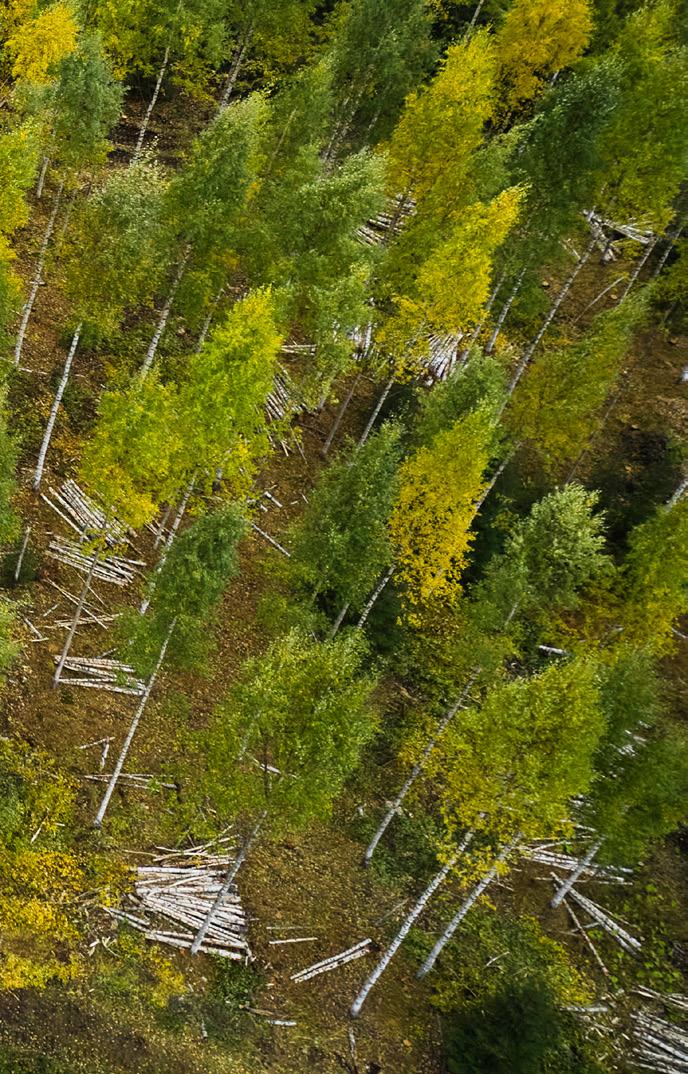
Only the healthy growth of the next tree generation enables the continuation of the forest cycle and the regeneration of the raw material.
49 01
responsibility
Environmental
Leading the way in the circular economy
Ponsse’s circular economy competence is particularly strong in the spare parts and used machine business. We sell and refurbish used machines in all our market areas and also spare parts in an increasing number of market areas.
Used machines refurbished by professional mechanics can be updated using various performance packages to meet modern standards. For example, Ponsse’s Scorpion Second Life refurbishment programme has more than 160 control points to ensure the effective operation of a used machine.
In addition to new parts, Ponsse provides its network with refurbished and reused spare parts. They support Ponsse’s goals of improving material efficiency and becoming carbon neutral. Recycled parts are an environmentally friendly option for forest machine maintenance, as we can effectively allocate resources tied to damaged spare parts to remanufacturing and reuse. In previous LCAs, the carbon footprint of a single remanufactured part was found to be a quarter smaller than that of a new part. Ponsse’s circular
economy model has been developed based on the company’s needs to promote the conversion of material flows into usable format and reduce the consumption of raw materials.
Ponsse has remanufactured spare parts for forest machines at its Reconditioning and Assembly Centre in Iisalmi since 2010. The focus is on the refurbishing of mechanical transmission parts, but the Reman range also includes hydraulic parts and forest machine information systems. The Spare Parts Reuse Centre, established in 2020, is located in the immediate vicinity of the Reconditioning and Assembly Centre. It receives damaged parts from customers, the factory and the sales network, and assesses their reuse potential in line with the principles of the circular economy. Both units work in close cooperation with Ponsse’s used machine services, in which
50 01
ENVIRONMENTAL RESPONSIBILITY IN PRACTICE 01 Environmental responsibility 02 Social responsibility 03 Governance
used forest machines are maintained and updated to extend their life cycle under the ownership of 2–4 new owners. When a machine finally reaches the end of its service life, it can be dismantled. Usable parts are refurbished to make low-cost spare parts, while any unusable parts are recycled as material. More than 90% of a forest machine’s weight consists of recyclable material, mainly steel and cast iron.
In 2023, we continued to expand our refurbishing operations into our subsidiaries, where services are provided closer to customers, without needing to transport damaged parts over long distances for remanufacturing. In addition to our own operations, we are developing refurbishing cooperation with our supplier network. Greenhouse gas emissions can also be reduced by minimising the amount of transported cargo. To support local refurbishing operations, Ponsse has developed refurbishing kits for various parts, consisting of the most typical components replaced during refurbishing. In 2023, Ponsse North America’s refurbishment unit moved to new facilities, which enables local operations to grow.
In 2023, based on the total mass of the parts, we refurbished 12% more parts than in the previous year. Higher refurbishment volumes in mechanical transmission are the main reason for the growth.
Environmental responsibility
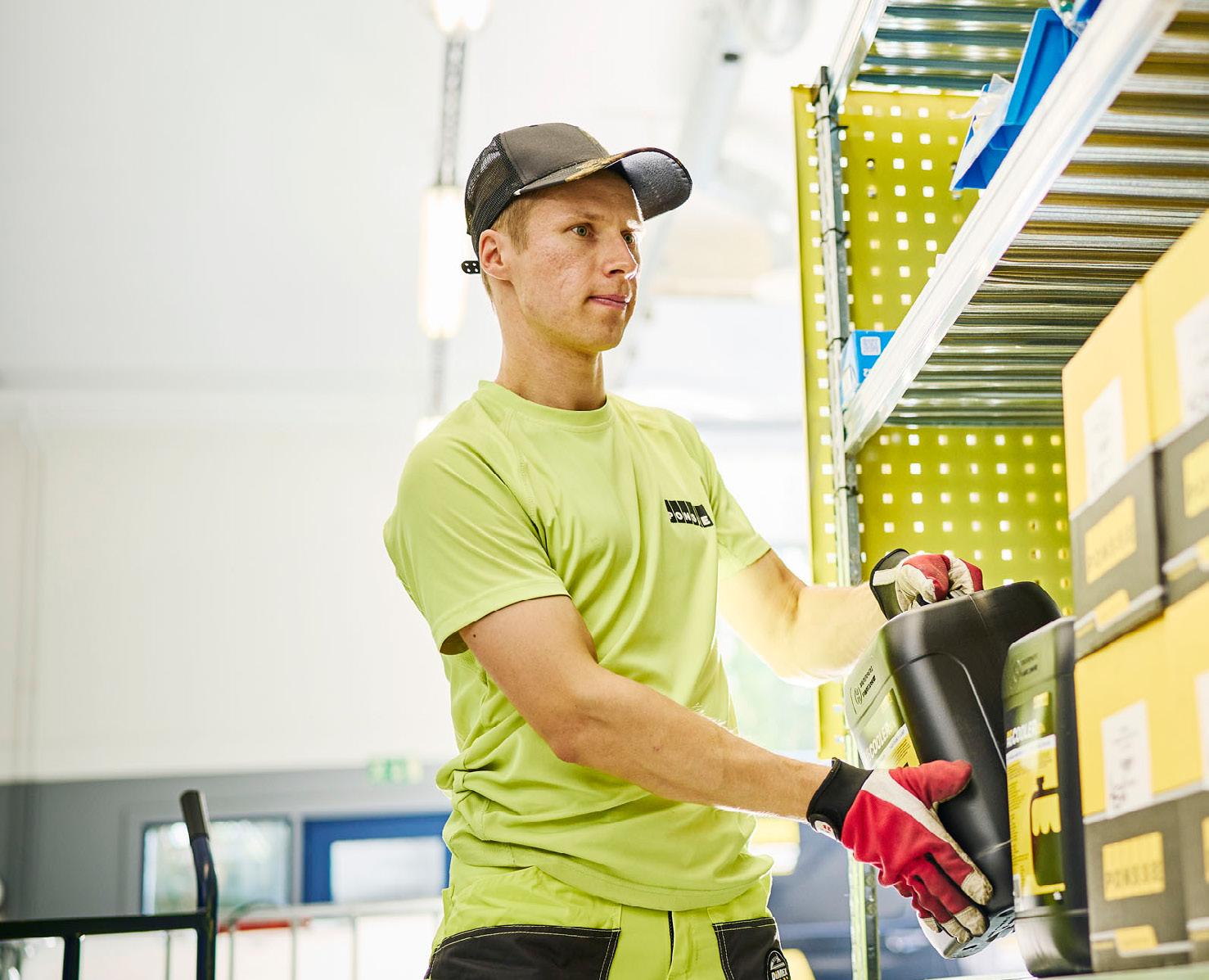
01
162,166 kg
Spare parts refurbished or brought back into use in 2023.
Social Responsibility



We improve the wellbeing of our people
52 02
01 Environmental responsibility 02 Social responsibility 03 Governance
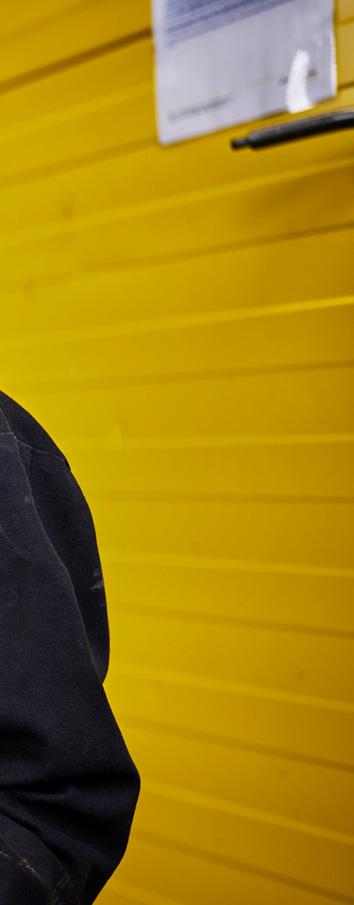
Social responsibility
We improve the wellbeing of our people
Ponsse is an equal and non-discriminating working community, in which everyone can work safely. We appreciate one another and take good care of each other, and our customers and network. Our machines are safe and ergonomic for their users.
02
98.2%
of our suppliers are committed to the Code of Conduct.
53
OUR PRINCIPLE
Human rights
At Ponsse, social responsibility means responsibility for the impact of our business activities on people, and continuously aiming to have a positive impact on our community. Ponsse has a strong value base that steers us to respect people and cooperation, and to develop our operations as part of our community.
At Ponsse, we are committed to ensuring that human rights are respected throughout our Group and in all our operations. Our work for human rights is based on the UN’s Guiding Principles on Business and Human Rights and compliance with law, as well as the OECD Guidelines for Multinational Enterprises. In accordance with the UN’s Guiding Principles, we are committed to respecting and supporting all internationally recognised human rights, including working life rights, regardless of the location.
Furthermore, we are committed to all equality and non-discrimination principles concerning human rights in all situations. This means that everyone must be treated equally without any discrimination regardless of their personal characteristics such as gender, ethnic origin, indigenous or minority status, language, religion, age, sexual orientation or any other personal reason.
54
02
SOCIAL RESPONSIBILITY IN PRACTICE 01 Environmental responsibility 02 Social responsibility 03 Governance
W e are committed to all equality and non-discrimination principles concerning human rights in all situations.
Social responsibility
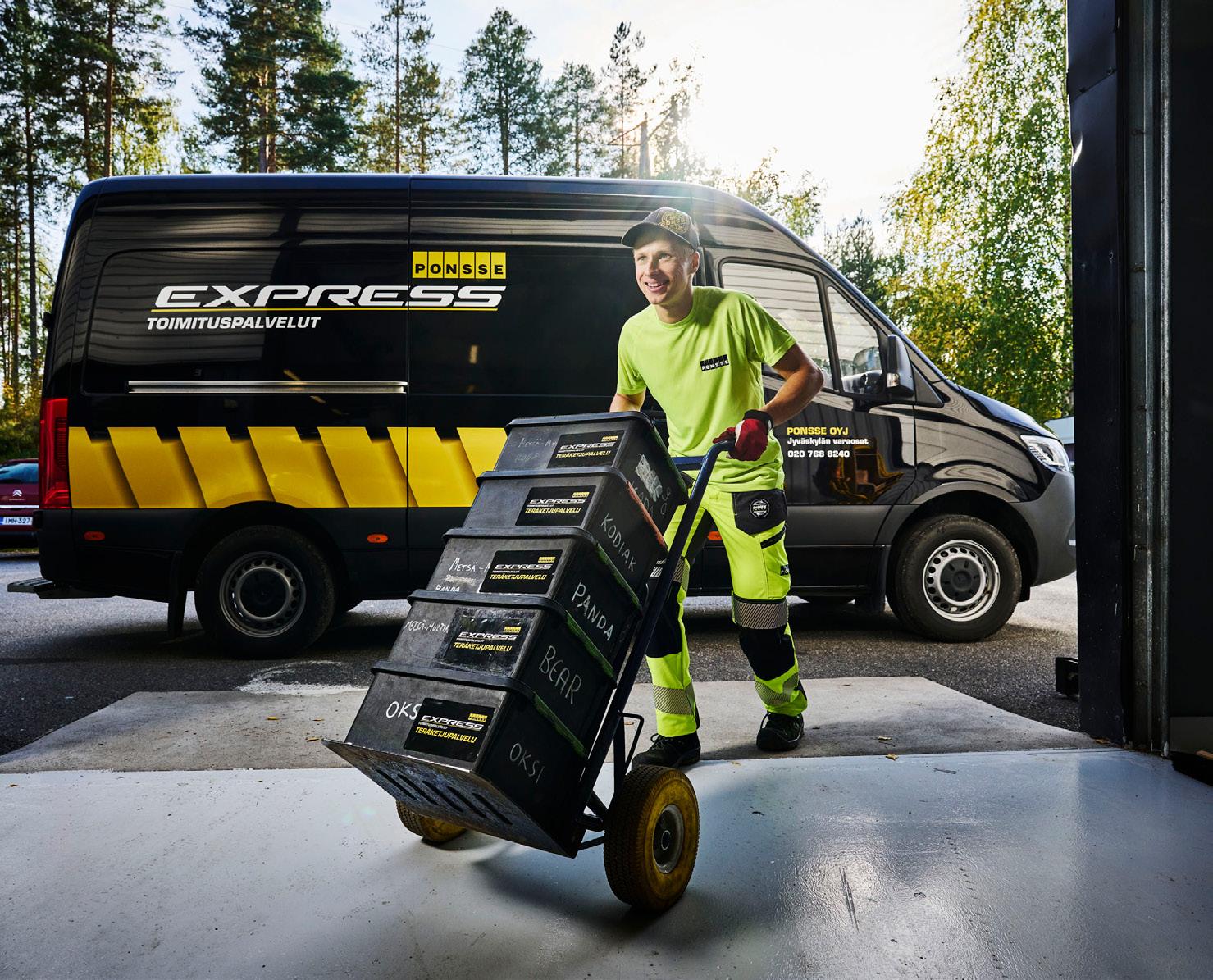
02
02
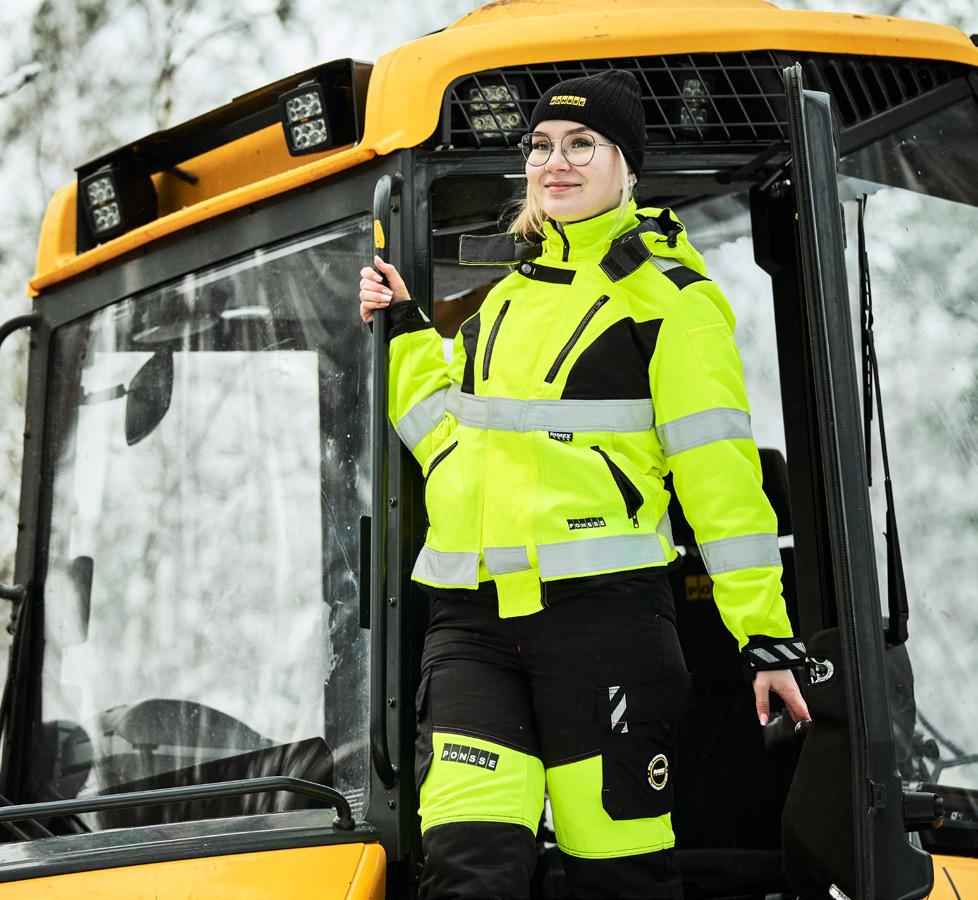
Key human rights themes at Ponsse
Ponsse’s human rights due diligence (HRDD) process was conducted and described at the end of 2023, assisted by external human rights specialists. The process was started by conducting a human rights impact assessment (HRIA) to assess the human rights impact and risks of Ponsse’s operations and specify the most significant human rights themes and standards.
As a result of the HRIA, we specified internal processes, monitoring and communication of Ponsse’s responsibility for human rights. We also assessed our development areas considering the four key groups of people related to it:
1) our working community;
2) customers and end users;
3) employees in procurement chains;
4) people in local areas and communities.
Handles inside and outside the machine and anti-slip walkways increase occupational safety. Powerful lights are also significant.
— katariina kauhanen, forest machine operator
56
01 Environmental responsibility 02 Social responsibility 03 Governance
1 Our working community
In accordance with our HRIA, we must pay special attention to the fulfilment of our responsibility for human rights in our working community. We need to ensure the management of our human rights impact in our processes and practices. We will focus especially on protecting the safety and health of our employees, including young employees and trainees.
2 Our customers and the end users
For our customers and the end users of our products, we need to pay special attention to the safe use and maintenance of our products.
3 Employees in procurement chains
Ponsse is committed to ensuring and developing its responsibility for human rights regarding employees in procurement chains. Our goal is to prevent any decreases in human rights in our value chain, while following the due diligence obligation. In procurement activities, we
need to focus partly on human rights no applicable to our own operations, including the prevention of forced and child labour. We have also identified sectors with high human rights risks related to our procurement activities (including the mining, textile and cleaning sectors) and high-risk raw materials related to our products (including certain minerals).
We ensure the fulfilment of our responsibility for human rights, including responsible procurement and product safety, also regarding Ponsse Collection products.
4 People in local areas and communities
Ponsse’s operations have an impact on people in local areas and communities especially through traffic around our production facilities and other locations, as well as their environmental impact. Our goal is to minimise our negative human rights impact and risks.
We will continue to develop the HRDD process to monitor the human rights impact and risks of our operations, prevent any negative impact and intervene in any diminishment of human rights.
Social responsibility
02
57
Equality and non-discrimination
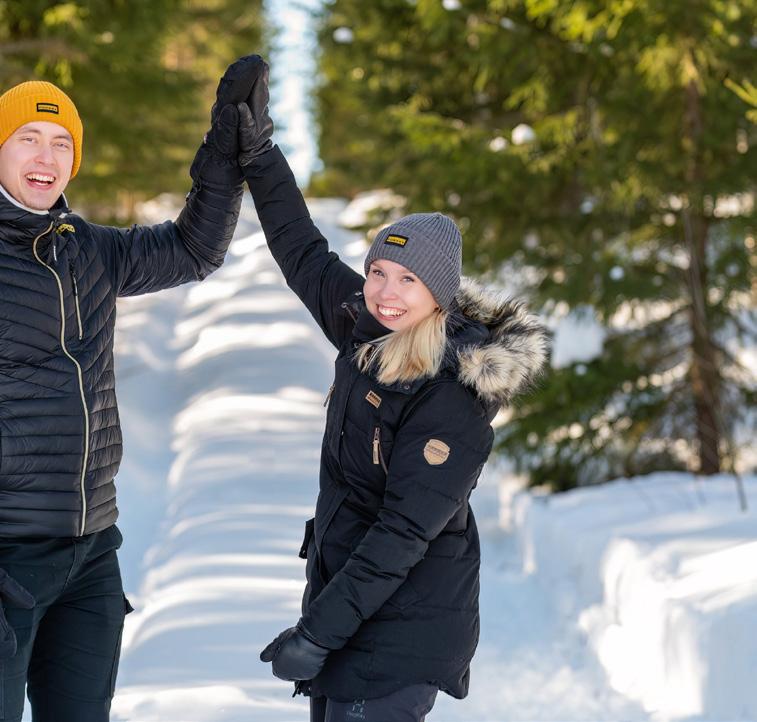
An equal and non-discriminating corporate culture promotes the wellbeing and employee experience of the personnel, reduces employee turnover, and helps recruit skilled professionals.
We seek to strengthen diversity in our working community, which is why we are increasingly focusing on the fulfilment of equality and non-discrimination. The company’s personnel group reviews Ponsse’s equality and non-discrimination plan annually. The goal of the plan is that all Ponsse people feel treated equally without any discrimination.
Our main guidelines
• We do not accept any discrimination against our employees or job applicants based on any personal reasons.
• We promote an equal, nondiscriminating and diverse work culture.
• All employees have equal opportunities to apply for various positions and to advance in their careers in accordance with their education and competence.
• As a rule, all our employees can apply for vacancies within Ponsse.
• Ponsse facilitates coordination between work and leisure through working hours arrangements and by adopting a positive approach to the use of family leave.
• We do not accept any form of harassment or bullying.
58 02
SOCIAL RESPONSIBILITY IN PRACTICE 01 Environmental responsibility 02 Social responsibility 03 Governance
The Finnish Act on equality between women and men requires that a gender equality plan must be prepared, dealing particularly with pay and other terms of employment. In 2021, we conducted a pay survey for the personnel working in Finland, including the distribution of women and men in various jobs. No significant differences were identified between the pay of men and women.
We conduct the pay survey every three years at Ponsse and revise the equality and non-discrimination plan every year in the company’s personnel group. The next pay survey will be conducted in 2024. Our new global personnel management system also enables the comparison of our personnel’s wages in our subsidiaries for the first time.
Ponsse operates in a largely male-dominated industry. At Ponsse, men accounted for 89 per cent of all employees in 2023, while the corre-
sponding figure for women was 11 per cent (2022: 88/12). Among supervisors, the percentage of women continued to increase to 17 per cent (14). We want to increase the percentage of women among our employees and to ensure genderneutral communication in general.
Our aim has been to find ways to improve the attractiveness of the forest and technology industries, but have not been able to achieve any major change in the gender distribution of job applicants. Innovation requires different perspectives and insights that are fed by differences. This is also why it is important to recruit the best professionals in the field, regardless of the gender or other personal background. We seek to enable diversity in the harvesting industry in general, by addressing diverse end users in the design of machinery and equipment.
02
59
Average duration of a career at Ponsse Average age of Ponsse employees 22% aged under 30 59% aged 30–49 19% aged over 50 7.8 yr. 39 yr. Age distribution of Ponsse employees Social responsibility
Occupational safety at Ponsse
Our objective for occupational safety and health is to develop our safety culture and mindset and prevent accidents by investing in preventive safety. We want to be an accident-free company in the future.
At Ponsse, developing the smooth flow and high quality of work is an integral part of safety activities. We are committed to improving occupational safety and health to meet the expectations of our personnel and stakeholders, and we comply with the legislation and the Group’s guidelines to ensure a safe working environment in all our operating areas.
We actively assess risks associated with the personnel’s occupational safety and health and take the corrective measures required to eliminate or minimise risks. We have also identified young employees and trainees as a risk group. Ponsse is a partner in various educational cooperation models and offers a workplace in which young people can take their first steps in working life. This means that Ponsse also has trainees aged under 18, and we pay special attention to protecting their health and development.
Ponsse is a partner in various educational cooperation models and offers a workplace in which young people can take their first steps in working life.
60 02
SOCIAL RESPONSIBILITY IN PRACTICE 01 Environmental responsibility 02 Social responsibility 03 Governance
Social responsibility
We comply with the ISO 45001 standard for occupational safety and health management in our operations. Our following companies are certified in accordance with the standard:
Ponsse Oyj, Epec Oy, Ponsse Latin America Ltda., Ponsse Uruguay S.A., and Ponsse Chile S.p.A.
LTIF
Ponsse measures occupational safety and health using the lost time injury frequency rate (LTIF), which represents the number of accidents leading to absences per one million working hours.

02
Developing and measuring occupational safety and health
In 2023, we developed the company’s safety strategy, harmonised cooperation between the Group’s subsidiaries, and shared best safety practices with our stakeholders. In addition, we strengthened our occupational safety and health organisation through recruitment and by specifying job descriptions. A person responsible for occupational safety and health has been appointed to all group companies which supports safety management, helps build a systematic occupational safety and health culture, and boosts the implementation of shared practices. Our goal is that safety is a significant part of the strong Ponsse culture, which the company is known for.
In 2023, we invested particularly in safety training in production in Finland which was reflected in a significant decrease in accidents. In contrast, the development of safety did not reach the previous years’ level in our maintenance operations in Finland and in certain subsidiaries. During the second half of the year, we initiated several measures to improve the level of safety in these locations by improving the efficiency of
preventive safety measures, training and safety communication. Of our production employees, roughly 14 per cent completed first aid training during 2023.
The Group’s LTIFR was 10.7 in 2023 (2022: 11.8). There were a total of 42 accidents leading to sick leave (2022: 44), of which 17 (19) caused fewer than three days and 25 (25) more than three days of sick leave. The most typical accidents caused minor injuries in hands and fingers. No fatal accidents took place during the year.
We engage our employees in safety activities in various ways. For 2023, we set a target for the number of safety observations for the first time. Our goal was for each Ponsse employee to make at least five safety observations during the year. Compared to the previous year, the number of safety observations increased by 103 per cent, resulting in 8,106 observations (2022: 3982). Even though we did not reach our target of 8,500 observations, we were able to engage our personnel better in the development of safety and in finding several key safety improvements.
62
02
01 Environmental responsibility 02 Social responsibility 03 Governance
In 2024, we will develop the accident investigation process to identify the root causes of accidents even better. As a result, we can target corrective measures more accurately. In addition, we will make the operating models of safety, monitoring, guidance and communication more systematic and effective. We will continue to direct measures at the continuous improvement of safety and at increasing safety awareness. For this year, we have set the same target for the number of safety observations as in 2023. When it comes to safety observations, our challenge is to analyse and classify individual observations better to support risk assessments, for example.
Social responsibility
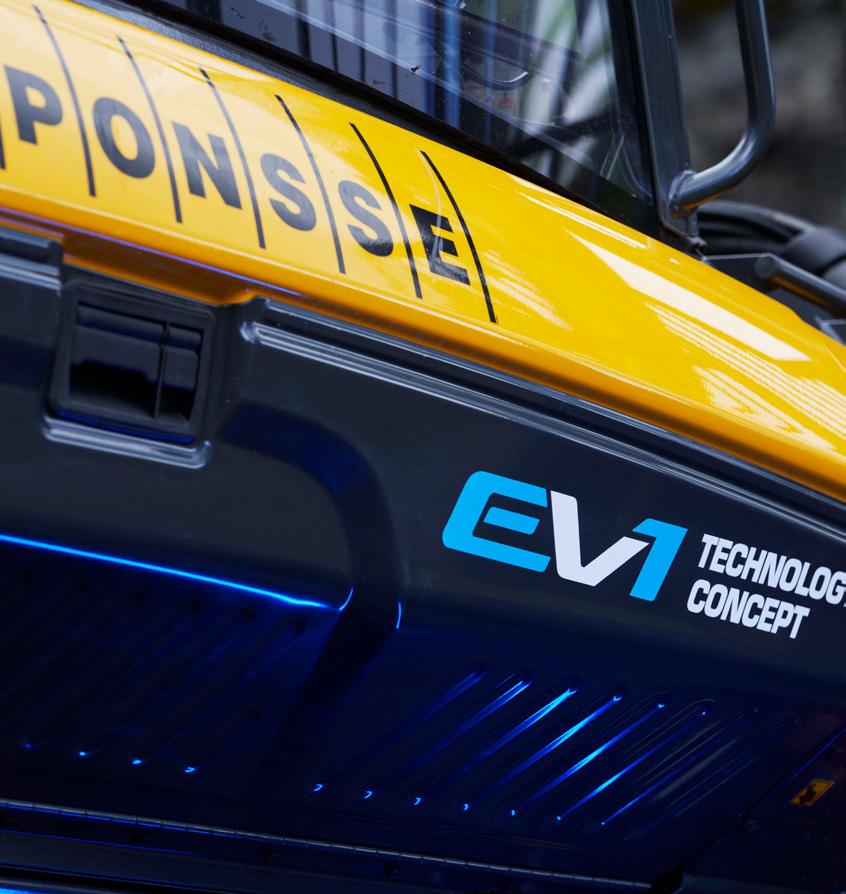
02
63
Group (%) LTIF 0 5 10 15 20 25 17.7 11.8 7.7 2021 2020 2022 Injury frequency 10.7 20232022
Product safety
Product safety is an integral part of Ponsse’s R&D activities. The company’s product safety team coordinates the process to ensure the product safety and compliance of PONSSE forest machines.
R&D projects, we ensure, for example, that we address safety in machine design and identify and minimise risks associated with new products and their properties. The primary aim is to minimise risks by means of design, although various protectors and safety devices can also be used. We issue warnings of any residual risks in operating and maintenance instructions and, if required, using separate warning stickers attached to machines. Machine operating and maintenance instructions provide safe ways to operate and maintain machines.
If necessary, machines already operating in the markets will be modified with safety-improving features if any new or other risks are identified that cannot have been addressed during machine design. In our R&D activities, we also seek to improve operator ergonomics, of which the Active Cabin and Active Seat features, which were entered in production in 2023, are good examples.
We participate actively in international standardisation activities and in the updating and development of standards that concern forest machines and their parts. These include international ISO and European EN standards. We can thus ensure that machines remain in compliance with requirements, even amidst constantly changing standards.
64
02 SOCIAL RESPONSIBILITY IN PRACTICE 01 Environmental responsibility 02 Social responsibility 03 Governance
We actively collect information about machine-related injuries, accidents and near-miss incidents in different market areas. Reported incidents are processed under the coordination of the product safety team. Depending on the incident, we carry out the measures required, including machine modifications, or send a safety bulletin to notify customers of a hazard and instruct them to take the correct measures to eliminate it. Ponsse Plc has processes in place for these measures to enable rapid and comprehensive responses. All findings of product safety made in conjunction with reporting are forwarded to our R&D unit so that they can also be addressed in the design of new machines.
For us, personnel training is also a key part of product safety. We provide various targeted training for R&D and the PONSSE network. Training provided for R&D is more technical and standards-based, whereas that provided for the network focuses on collecting product safety feedback and reporting, for example. The goal of training is to increase the organisation’s awareness of product safety and related innovation, and improve machine safety to minimise the risks they present to people and the environment.
Social
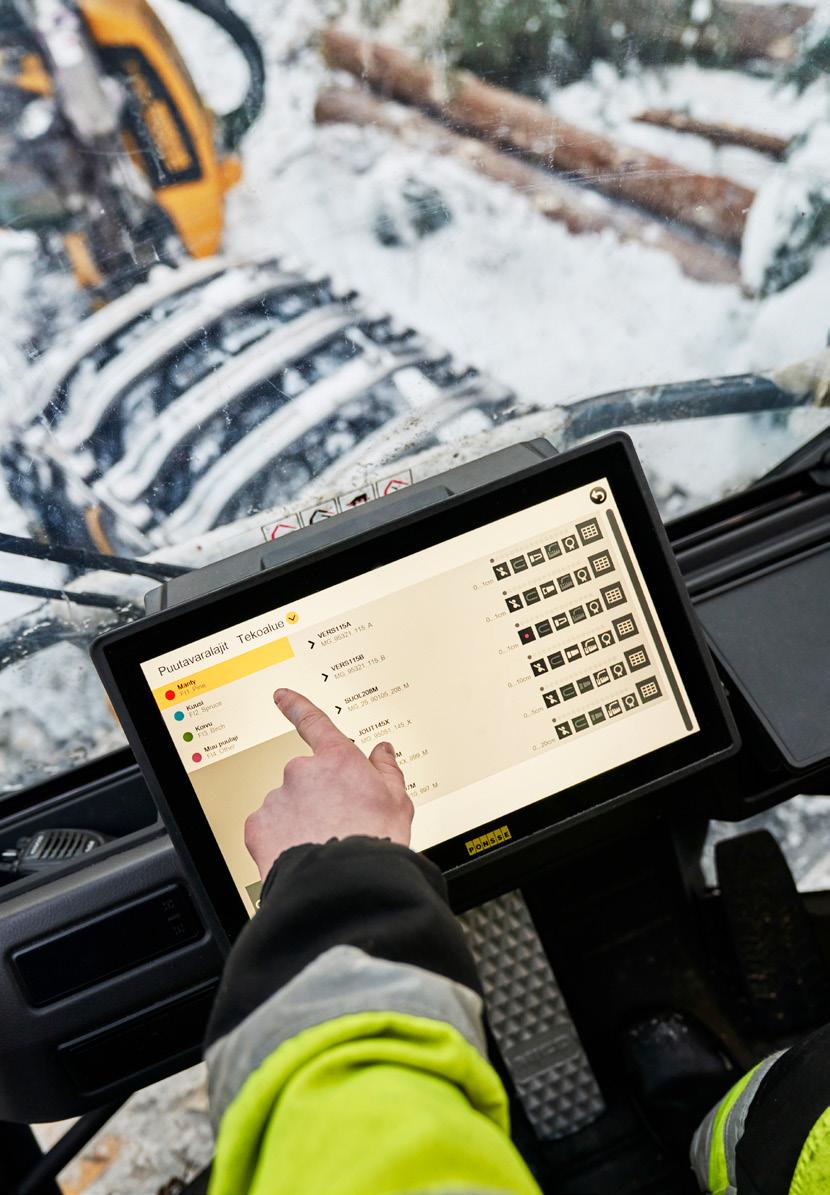
02
responsibility
02
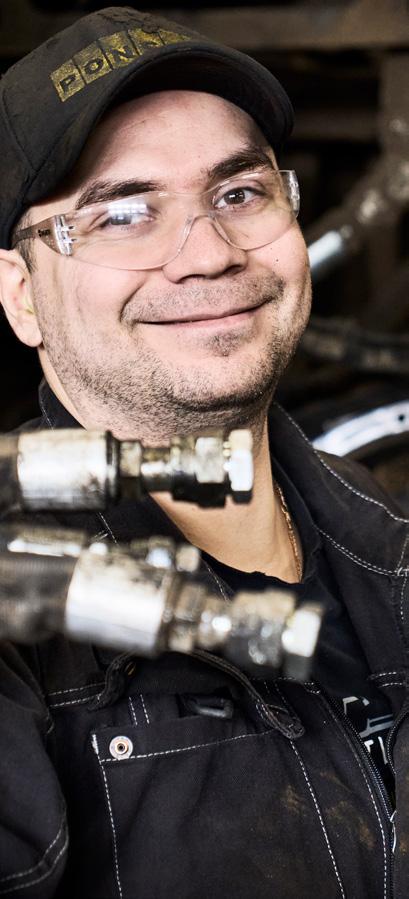
Our number of personnel increased and there were 6 per cent, i.e. 122 people, more of us than in 2022 (In 2022: 2.8%, 55 people).
Equal and skilled personnel who feel well
In promoting the wellbeing of the Ponsse people, we want to address physical, psychological and social wellbeing. We share this idea throughout the Group and also seek to implement practices found effective in the organisation in Finland in other Ponsse companies across the world.
In 2023, we deployed a break exercise program for all personnel in Finland, including employees who carry out physical work in production and maintenance. Our agreement with the service provider also allows the program to be used on personal devices and outside the workplace.
As a new wellbeing benefit for employees, we adopted the bicycle benefit in Finland, which has been used by almost 20 per cent of our personnel in the country.
In addition to these changes, we continued our proven practices and services. In 2023, we continued to use the anonymous Auntie service to strengthen psychological wellbeing, brief psychotherapy as part of the occupational healthcare service agreement and weekly occupational
physiotherapist appointments for production employees at the factory. Furthermore, we strengthened our ergonomics expertise at our service centres by increasing workplace visits by occupational physiotherapists.
In Finland, our factory in Vieremä became a smoke-free workplace in August 2023, and it was followed by our other locations in Finland at the beginning of 2024.
Nearly 20% of our personnel in Finland has started to use the new bicycle benefit.
66
SOCIAL RESPONSIBILITY IN PRACTICE 01 Environmental responsibility 02 Social responsibility 03 Governance
Ponsse Group employees
2,110 employees (in 2022: 1,988)
44% (42) personnel in other countries
56% (58) personnel in Finland (including the subsidiary Epec Oy)
100% of our personnel within the scope of reward schemes
Social responsibility
02
Ponsse Group companies:
Ponsse Plc, Finland (parent company)
Ponsse AB, Sweden
Ponsse AS, Norway
Ponssé S.A.S., France
Ponsse UK Ltd., United Kingdom
Ponsse Machines Ireland Ltd, Ireland
Ponsse North America, Inc., USA
Ponsse Latin America, Ltda.,Brazil
Ponsse Uruguay S.A., Uruguay
Ponsse China Ltd., China
Ponsse Chile S.p.A., Chile
Ponsse Czech s.r.o., Czech
Epec Oy, Finland
67
Measuring employee experiences and wellbeing at work
Motivated employees who feel well have a significant positive impact on work results and customer experiences. We monitor the Ponsse people’s employee experience and wellbeing by the following means:
02
• Performance appraisals twice a year
• The eNPS index to measure the employee experience and the Pulssi wellbeing survey twice a year
• An annual survey to measure the quality of management
• Extensive personnel surveys every two to three years
We have set an eNPS target of 40.
At the end of 2023, the employee Net Promoter Score (eNPS) was 31 based on 1,069 responses. While the score increased from 22 in the previous year, there was still significant variation between companies and operations. Open-ended feedback highlighted management and supervisory work, as well as compliance with shared practices. In our subsidiaries, responses also underlined job satisfaction.
We also asked which of the sustainability goals the Ponsse people consider to be the most meaningful. In Finland, 42 per cent of all respondents selected We are a reliable partner who values community, while the personnel of our subsidiaries chose We improve the wellbeing of our people. We have set an eNPS target of 40.
In 2023, we conducted an extensive personnel survey, with its total score of 4.09 (on a scale from 1 to 5) based on responses from 1,365 Ponsse people.
68
01 Environmental responsibility 02 Social responsibility 03 Governance
Social responsibility
Personnel survey 2023
Highest total scores at an excellent level (at least 4.3):
• Trust in the company’s reputation
• Customer-driven approach
• Trust in the company’s success, also in the future
• Fulfilment of gender equality
• Ponsse is a good employer
• Knowledge of safety instructions
• I feel safe at work
• The employer invests in safety
• I have not experienced any harassment or bullying in my workplace over the past year
• I understand the significance of my work for the company’s direction and strategy
Lowest total scores at a satisfactory level (3.0–3.5):
• Operational efficiency in the organisation
• Cooperation between different functions
• Trust in further measures to be taken based on the survey
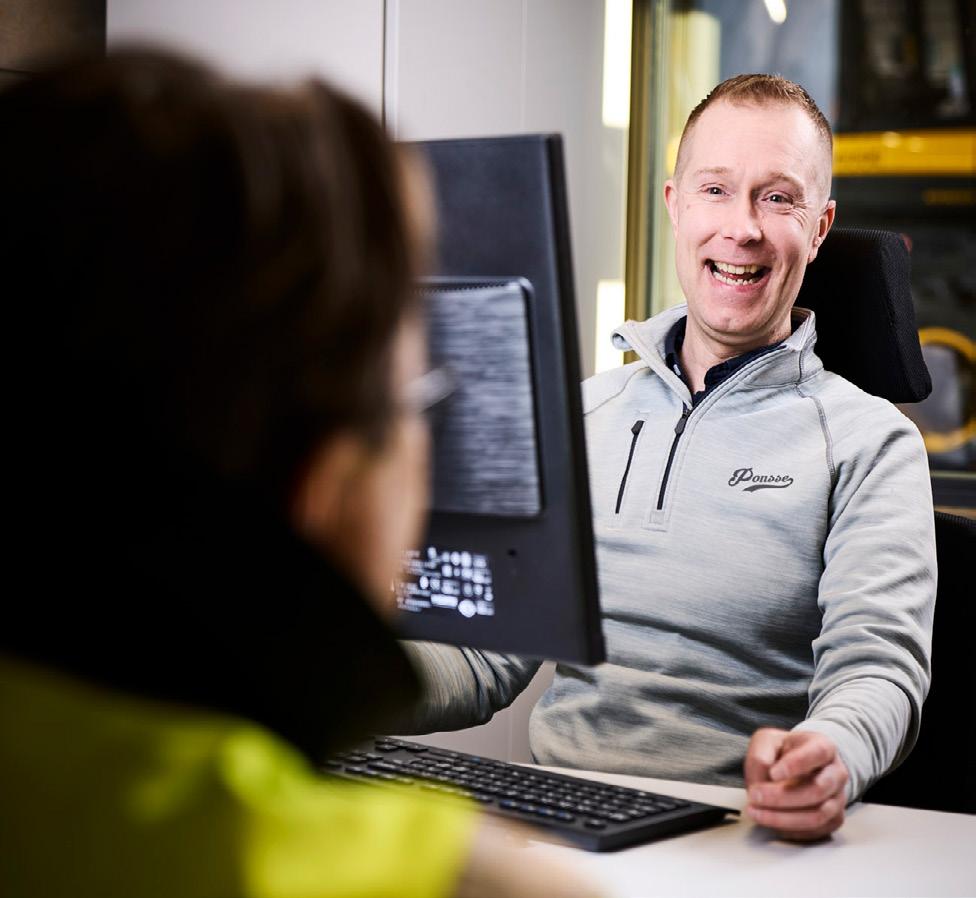
02
69
02

Employees rated Ponsse at an excellent level as an employer. In terms of safety, 68 per cent of all Ponsse people considered to have a full knowledge of the safety instructions related to their work, 62 per cent found their work to be wholly safe, and 57 per cent considered the employer to have made excellent investments in occupational safety and health. In addition, 72 per cent of all employees saw that there is no bullying or harassment in the workplace, and 58 per cent considered to fully understand the significance of their work for the company’s direction or strategy. No theme was considered to be at a weak level requiring development.
In 2023, the annual survey to measure the quality of leadership had 1,251 (1,244) respondents. The Group’s average score was 3.20 (3.28) on a scale from 1 to 4, which was in line with our target of >3.
Ponsse has a straightforward “can-do” attitude. Work is done earnestly, together, without leaving anyone behind.
— milla pasanen and tommi luukkonen, Ponsse Pro mechanics
The voluntary employee turnover decreased to 8.1 per cent (11.3), while there continued to be significant differences between our companies. In recent years, the mobility of employees on the job market has increased, but we have also identified development needs in our companies that have experienced a significant employee turnover. Our goal is to lower the Group’s employee turnover under five per cent.
01 Environmental responsibility 02 Social responsibility 03 Governance
Ensuring skilled employees
We ensure the competence and professional skills of our employees through regular training and job rotation opportunities. We identify training needs relating to our strategy, goals and technological development, and we also inquire about our employees’ views of training needs during performance appraisals held twice a year. In addition, we support the personnel’s voluntary training, including degree programmes. In 2023, we prepared larger plans for competence development from the perspectives of electrification, automation and sustainability, among others.
To support our personnel’s competence and recruitment, we are engaged in cooperation with universities, universities of applied sciences and vocational schools. We also provide vocational training in our facilities through the “Ponsse Polku” (Ponsse Training Path) programme of Ylä-Savo Vocational College. The programme has been run for more than ten years now to train mechanics and welders, and it has been a significant recruitment channel for us. In 2023, we started the Ponsse Pro training programme with the Valtimo campus of the North Karelia Municipal Education and Training Consortium Riveria. In the programme, we train mechanics into professionals in forest machine maintenance and then give them jobs at our service centres.
With higher educational institutions in Finland, Ponsse has student programmes with the University of Tampere and Savonia University of Applied Sciences. The “Student Deal” programme of the University of Tampere is intended for students completing a master’s degree in automation technology, while the target group of the “Digital Professional” programme of Savonia University of Applied Sciences consists of students of software development. Our country organisations are also engaged in cooperation with local educational institutions. The goal is to provide students with topics and opportunities to write their thesis and a possibility to be engaged in working life during their studies and complete part of their studies during on-the-job training periods.
We are monitoring job applicants’ experiences in Finland through the NPS feedback survey conducted during recruitment. We have also expanded our operations in locations in which education in technology is provided. In Finland, Ponsse has units in Kajaani, Kuopio and Tampere in addition to the Vieremä factory and the maintenance service network, and also in Turku with our technology company Epec.
Our employer image was supported by the reputation award granted to Ponsse for the second time in the 2023 Reputation&Trust survey, in which private investors considered Ponsse to be the most highly reputed company in terms of sustainability.
Social responsibility
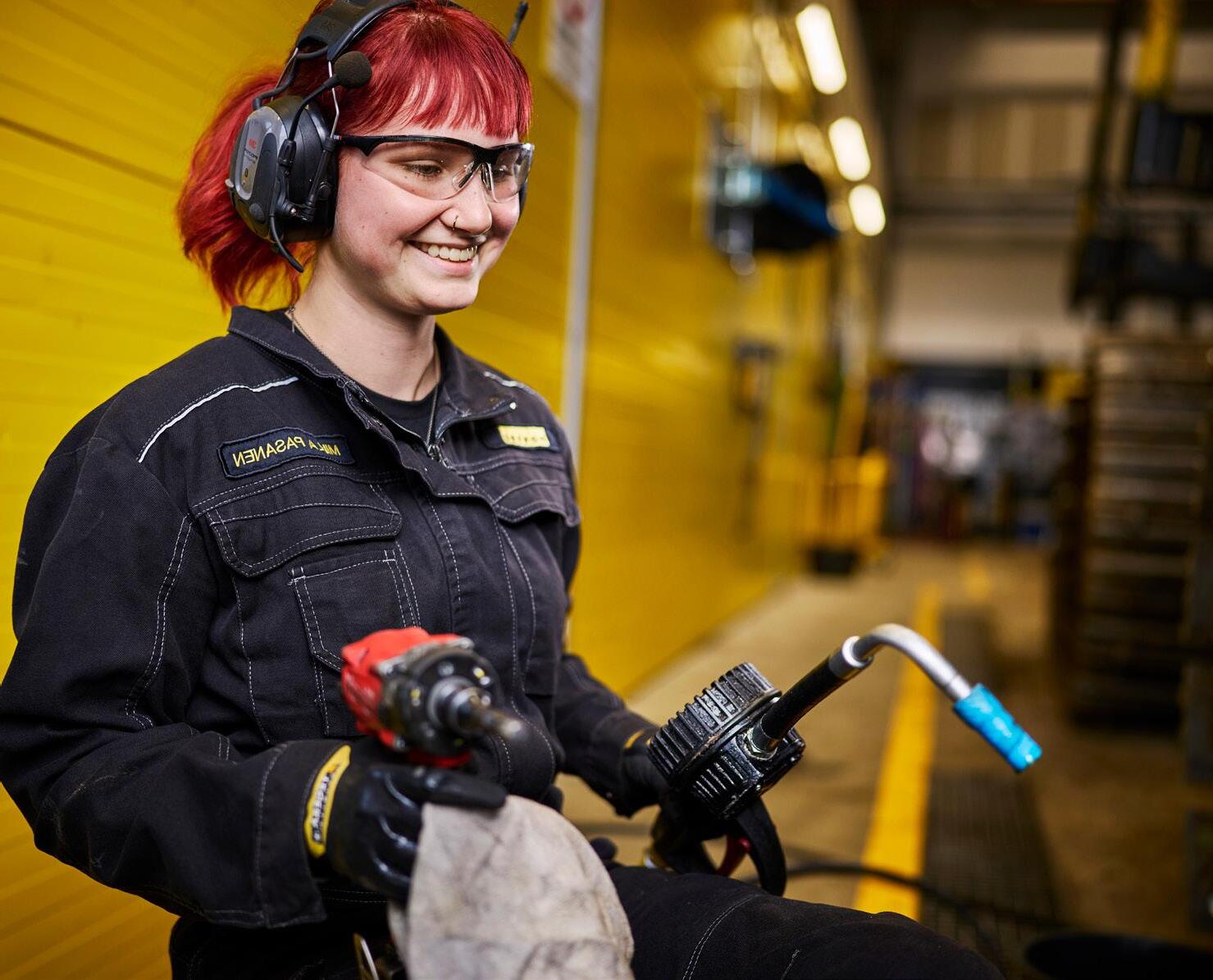
02
02

Ponsse’s values

We truly care

We work for our customers

We are honest
The Ponsse spirit – working together to put it briefly – is materialised when we work every day according to our values.

We are open for renewal
72
01 Environmental responsibility 02 Social responsibility 03 Governance
Ponsse’s culture
Ponsse has a unique corporate culture. The Ponsse people have been the company’s strongest and most significant assets throughout its history, and our culture is our strength.
Since its establishment in 1970, Ponsse has grown into one of the leading cut-to-length forest machine companies in the world. Today, Ponsse employs 2,110 people across the world, with the number of employees having grown by 185 per cent in ten years.
Amidst all the strong growth, internationalisation and technological development, it is also good to stop from time to time to examine the corporate culture. While we want to foster our unique culture, we also want to move forward and ensure the fulfilment of our strategy and the achievement of our business goals, supported by our culture. In 2023, Ponsse assessed the current state of its culture and any areas for development. This process engaged 450 Ponsse people, with each employee being able to give feedback on our culture in the Pulssi personnel survey.
The assessment of our values signified the first steps in the development of our culture. We updated our company’s values while respecting the past and setting our sights on the future. The values guide our work and our behaviour every single day. By complying with our values, everyone at Ponsse can have an impact on how our customers see us.
The Ponsse spirit – working together to put it briefly – is materialised when we work every day according to our values. In other words, “we” is always more important than “I”, while we also take care of the individual. Often, it also means a spark in the eye and great professional pride in doing the best for the customer. We hope that the Ponsse spirit is conveyed to our customers through our daily activities, because they are for whom Ponsse exists.
73
02
responsibility SOCIAL RESPONSIBILITY IN PRACTICE
Social

High harvesting quality supports forest regeneration. In forest management, focus is not only on making profit at a specific time but also on ensuring that forests remain profitable in the future.
— timo komulainen, forest owner
74 02
01 Environmental responsibility 02 Social responsibility 03 Governance
Honesty and cooperation
Honesty, ethics and communality in operations are vital factors for us. Good corporate governance and our Code of Conduct define how we treat people equally, conduct sustainable business, and engage in close cooperation with our partners.
Mutual trust with our various stakeholders is based on open long-term cooperation. Our key stakeholders include our customers and members of the entire Ponsse network. We want to know our customers personally and also address their families and stakeholders in our activities.
The Ponsse network consists of our own companies, as well as our retailers who we always aim to treat as equivalent to our own companies.
We continuously collect feedback in daily customer service situations, in R&D projects carried out with customers and at customer seminars, which we held in 16 different countries in 2023. The product management organisation ensures that customer feedback is addressed in R&D processes.
We monitor customer satisfaction in all our sales and service activities. At the end of 2023,
the Ponsse network’s NPS was excellent at 52 (54) based on 944 (1,097) responses. The NPS of Ponsse’s subsidiaries increased to 48 (43) and that of our dealers was once again excellent at 59 (76). The NPS is measured on a scale from -100 to +100, with monitoring being a continuous process regarding products, maintenance and spare parts. Our NPS target is 60.
Our key stakeholders
• Customers and the forest industry as a whole
• Personnel
• Dealers and contractual service partners in the Ponsse network
• Subcontractors and suppliers
• Owners
• Local communities and associations
• Legislators and the authorities
• Schools and educational institutions
• Funding providers, investors and analysts
• Media
75
02 Social responsibility SOCIAL RESPONSIBILITY IN PRACTICE
Investments in the local dimension
We find it important to be a responsible company in the communities in which we operate. We always select our partners based on business criteria. We have identified our impact on our local community and our opportunity to create regional wellbeing through profitable business activities that address the environment. This is why we also take the local dimension into account when we select our partners.
Ponsse’s production and head office are still located in the company’s birthplace in Vieremä, and we have a high impact on regional employment in Upper Savonia. At the end of 2023, Ponsse directly employed 645 (658) people at our factory and 121 (119) people at our Iisalmi logistics centre and in our maintenance
services. In addition, nearly 400 employees worked in companies that are based in the partnership business park located in the immediate vicinity of our factory and mainly provide Ponsse with subcontracting or components.
In addition, our sports sponsorships highlight the local dimension, a shared set of values and long-term partnerships, ranging from children and young people to professional sports.
We know our partners
We are committed to carrying out business sustainably and responsibly. We expect that parties outside Ponsse also follow the principles of our Code of Conduct, where applicable, when they do business with Ponsse or on behalf of Ponsof
76
purchases from Ponsse’s subcontractors located within a 25-kilometre radius from our production
purchasing
02 01 Environmental responsibility 02 Social responsibility 03 Governance
Local
47%
se. External parties include Ponsse’s business partners, suppliers and customers, as well as the Ponsse service network. We require all our suppliers to commit to the Supplier Code of Conduct. Of our direct suppliers, 98.2 (90) per cent have approved our Code of Conduct either by signing Ponsse’s Supplier Code of Conduct (82 per cent) or by committing to their own similar guidelines (17 per cent). In addition, our procurement policy and guidelines steer our suppliers towards sustainable ways of working.
The management of supplier relationships is based on systematic contact, with which we seek to develop our suppliers’ performance in the long term and thereby enable the continuous development of competitiveness throughout the supply chain. Supplier quality
is assessed not only in terms of technological or manufacturing capabilities but also through cost efficiency, quality criteria, audit results and delivery reliability. New suppliers are also assessed against ESG criteria. Ponsse uses a service that enables us to check our partners’ backgrounds based on risks as part of our business processes.
In 2023, Ponsse prepared a procurement policy, which also addresses our sustainability goals. In addition, the company automated the supplier background check process and developed risk assessments for new suppliers. The assessments cover our suppliers’ financial standing, background and ownership, future outlook based on risk metrics, and their sustainability and reputation in general.
Social responsibility
02
77
of Ponsse’s purchases in the EU area (73% in Finland) Finland Local purchasing 97%
Key personnel figures
Group personnel on average
Group personnel, last day
Personnel in Finland, %
Personnel in other countries, %
Permanent employees, %
Fixed-term employees, %
Full-time employees, %
Part-time employees, %
Average duration of employment, years
Voluntary employee turnover, %
Average age of the personnel
The personnel’s age distribution
Under 30 years
30–49 years
Over 50 years
Gender distribution, % Female Male
Gender distribution among supervisors, %
Gender distribution in the Management Team
78
Female
Male
% Female Male
of Directors % Female Male
scheme coverage 2,106 2,110 56% 44% 98% 2% 98% 2% 7.8 8.1% 39 22% 59% 19% 11% 89% 17% 83% 22% 78% 29% 71% 115.3 100% 2,016 1,988 58% 42% 97% 3% 97% 3% 8.0 11.3% 39 22% 59% 19% 12% 88% 14% 86% 13% 87% 13% 88% 107.9 100% 1,825 1,933 61% 39% 97% 3% 98% 2% 7.3 7.2% 38 24% 56% 20% 11% 89% 12% 88% 13% 87% 14% 86% 87.7 100% 2023 2022 2021 4% 6% -3% 5% 1% -33% 1% -33% -3% -28% 0% 0% 0% 0% -8% 1% 21% -3% 69% -10% 123% -19% 7%Change, % from last year 02 01 Environmental responsibility 02 Social responsibility 03 Governance
Gender distribution in the Board
Salaries and wages, EUR million Incentive
Personnel by function, 2023 (2022)
Supporting functions (incl. development of digital services)
Machine sales and marketing Service and parts
R&D
Supply chain
571 (580)
2,110 (1,988)
196 (179) 120 (112)
Personnel by personnel group, % / qty, 2023 (2022)
Blue-collar employees
White-collar employees
198 (199)
1,025 (918)
2,110 (1,988)
60 %,1,269 (60 %, 1,193)
The figures are based on the situation on the last day of the year.
Social responsibility
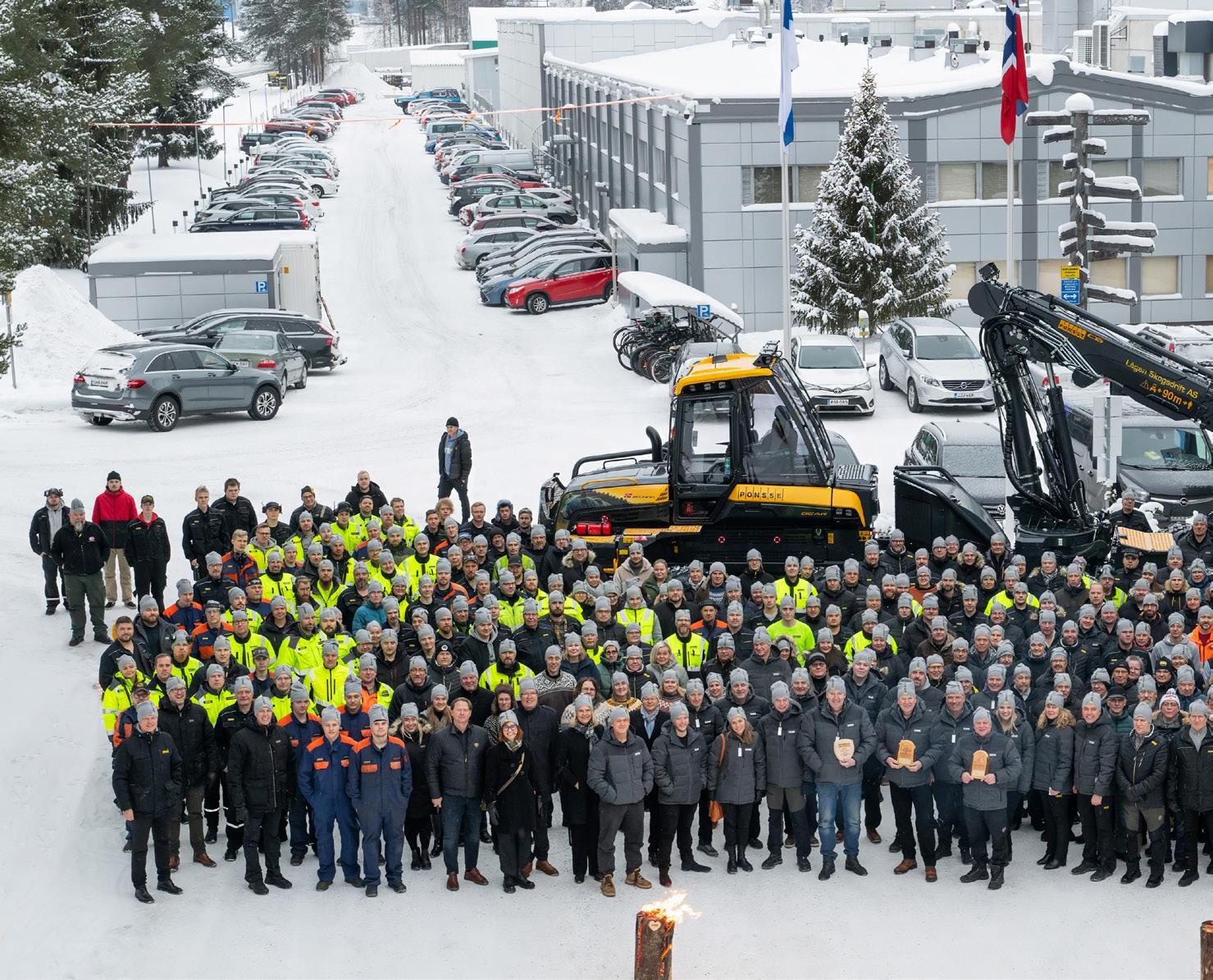
02
40 %, 841 (40 %, 795)
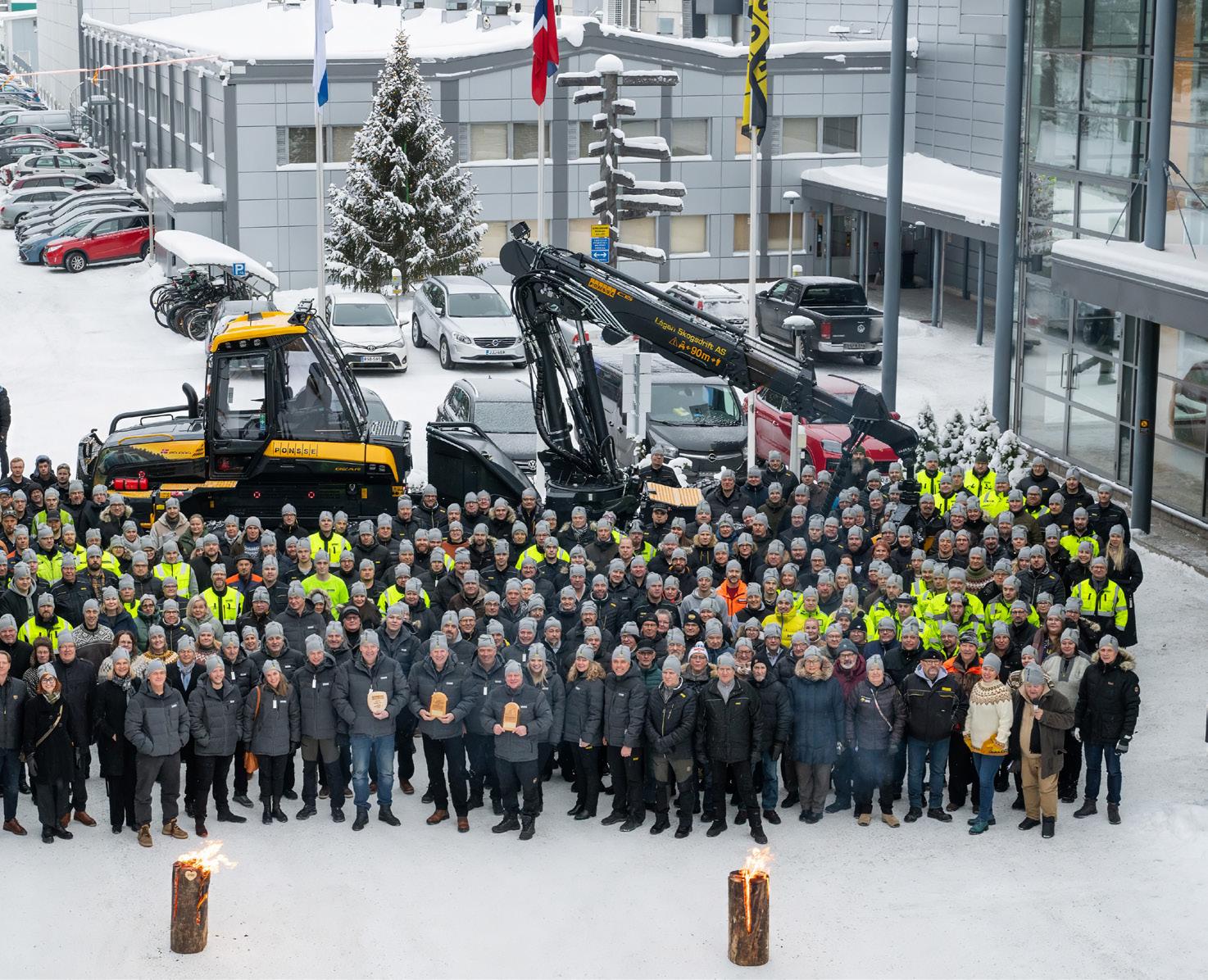
by company Ponsse Plc Ponsse AB Ponsse AS Ponssé S.A.S. Ponsse UK Ltd. Ponsse Machines Ireland Ltd Ponsse North
Inc. Ponsse Latin America, Ltda. Ponsse Uruguay S.A. Ponsse China Ltd. Ponsse Chile S.p.A. Ponsse Czech s.r.o. Epec Oy Total group personnel 972 73 13 42 29 8 83 501 114 35 30 17 193 2,110 964 72 12 34 28 8 88 418 112 35 25 16 176 1,988 1,004 71 12 42 29 7 86 390 109 33150 1,933 2023 2022 2021 02 Development of the number of personnel Number of personnel Finland (Oyj + Epec) Abroad Total 1,165 945 2,110 1,140 848 1,988 1,154 779 1,933 2023 2022 2021 The figures are based on the situation on the last day of the year. 2000 0 1000 2021 1,933 2022 1,988 2023 2,110 01 Environmental responsibility 02 Social responsibility 03 Governance
Personnel
America,
Voluntary employee turnover by company
Voluntary employee turnover in Finland and other countries
Social responsibility
The figures are based on the situation on the last day of the year.
81
Plc Ponsse AB Ponsse AS Ponssé S.A.S. Ponsse UK Ltd. Ponsse Machines Ireland Ltd Ponsse North America, Inc. Ponsse Latin America, Ltda. Ponsse Uruguay S.A. Ponsse China Ltd. Ponsse Chile S.p.A. Ponsse Czech s.r.o. Epec Oy Group 4.3% 1.4% 0.0% 8.2% 10.4% 36.4% 16.1% 17.1% 0.9% 0.0% 7.1% 28.2% 6.9% 8.1% 7.8% 7.1% 15.4% 21.1% 17.2% 0.0% 4.6% 24.9% 8.3% 0.0% 0.0% 0.0% 6,0% 11.3% 5.2% 2.9% 8.3% 5.0% 11.1% 25.0% 6.1% 15.1% 11.1% 6.1%4.2% 7.2% 43 1 0 3 3 3 14 81 1 0 2 5 12 168 78 5 2 8 5 0 4 107 9 0 0 0 10 228 50 2 1 2 3 2 5 51 11 26 131 989 72 13 37 29 8 87 474 114 26 28 18 173 2,068 1,002 70 13 38 29 7 87 430 108 34 23 17 168 2,016 967 69 12 40 27 8 82 337 99 33142 1,825 % % % Qty Qty Qty Average Average Average 02 Finland (Plc and Epec) Foreign countries Total 4.3% 1.4% 7.5% 16.5% 5.0% 10.6% 43 1 0 88 140 228 56 75 131 989 72 1,170 847 1,119 707 % % % Qty Qty Qty Average Average Average 2023 2022 2021 2023 2022 2021
Ponsse
Governance
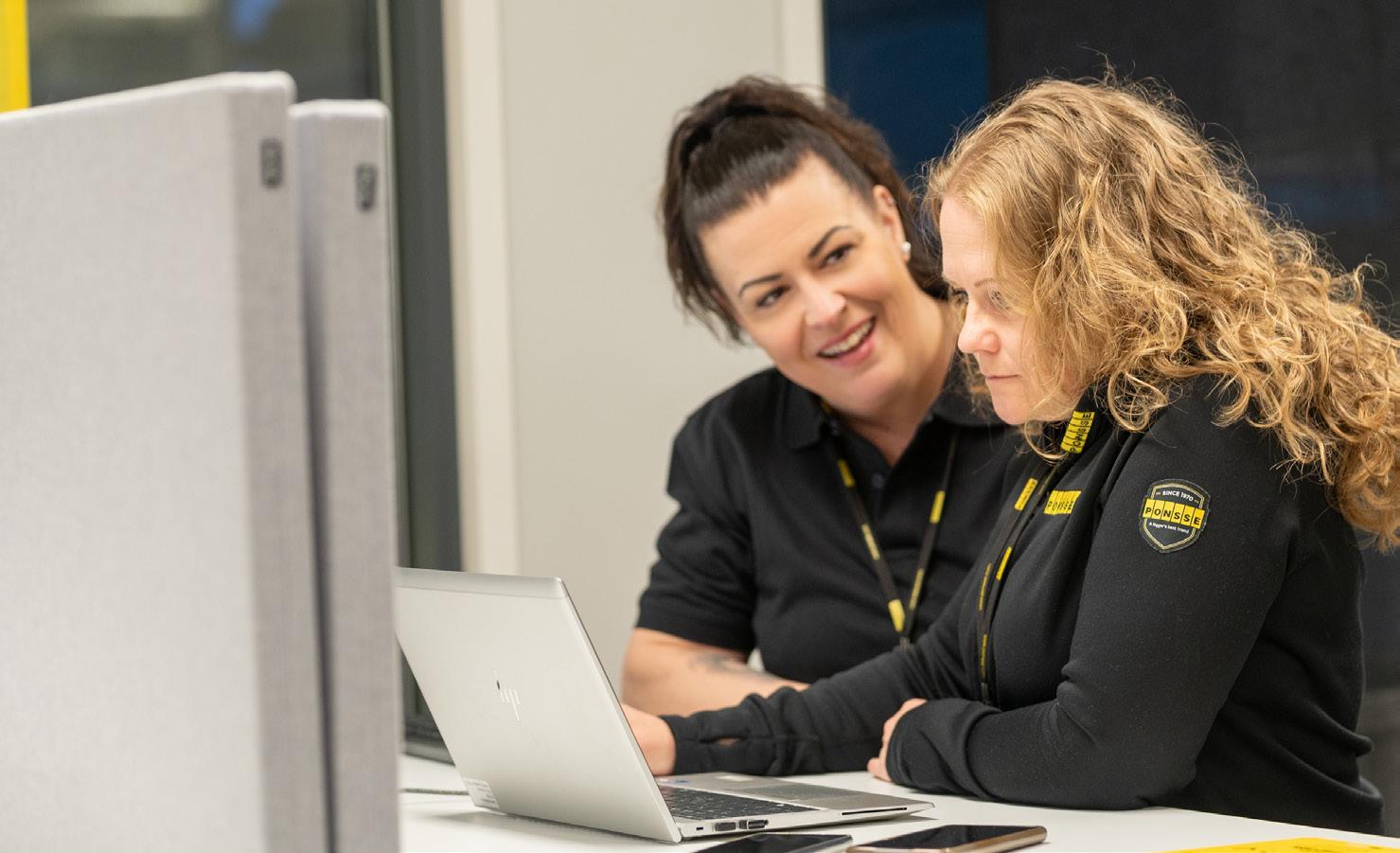


We are a reliable partner who values community
82 03
01 Environmental responsibility 02 Social responsibility 03 Governance

We are a reliable partner who values community
We operate honestly, ethically and communally in all communities in which we are present. Good corporate governance and our Code of Conduct steer us to treat people equally, conduct sustainable business and engage in confidential cooperation.
03
EUR 49,5 M
83
OUR PRINCIPLE
Governance
The amount of taxes and duties we paid in 2023.
Responsibility management and practices
Ponsse’s shareholders, Board of Directors and management are committed to advancing corporate responsibility. The company’s Board of Directors receives regular updates on the company’s responsibility activities and risks and opportunities related to corporate responsibility, and approves relevant key policies and guidelines.
In 2023, Ponsse’s Annual General Meeting appointed a specialist in responsibility management to the company’s Board of Directors. The Board of Directors discussed sustainability as part of other processes and business reviews. As a separate theme, Board of Directors also discussed the goal set in the company’s business strategy to achieve carbon-neutral product solutions and operations and make related
investments. The Board of Directors also assessed the company’s responsibility strategy and the key focuses of sustainability activities. In 2023, the incentive plans for management and, to some extent, for supervisors took into account the results of the eNPS survey which measures employee experience. In 2024, the incentive plans will be extended to include the LTIF result which measures accident frequency.
Taxes paid, EUR million (consolidated figure)
Finland’s share of taxes paid
84 30 30 40 40 50 50 Operating profit, EUR million
Net sales, EUR million
03 GOVERNANCE IN PRACTICE 0 20 2021 50.0 2022 46.6 0 0 10 10 20 20 2022 2022 39.3 20.0 2021 25.9 2021 43.0 800 0 400 600 200 2022 2021 608.3 755.1 2023 821.8 2023 49.5 2023 27.0 2023 47.2 40 60 01 Environmental responsibility 02 Social responsibility 03 Governance
Responsibility is an integral part of Ponsse’s business strategy. The Group’s President and CEO is responsible for ensuring that corporate responsibility is included in the company’s strategy and risk management processes. The Group’s Management Team is in charge of function-specific responsibility goals, their monitoring and achievement, and the identification of operational risks and opportunities associated with responsibility. A chief responsibility officer was appointed in the Group’s Management Team at the beginning of 2023.
Ponsse’s responsibility steering group convenes four times a year to review measures related to the promotion, execution and monitoring of responsibility goals. The steering group’s members are the President and CEO, CFO, HR Director and Chief Responsibility Officer, who reports the advancement of responsibility goals to the steering group.
In 2022, the company defined key responsibility goals based on a materiality analysis. We support their achievement through annual functionspecific goals and measures as part of the company’s annual strategy process. In addition to the company’s management, the materiality analysis involved 440 employees through an electronic questionnaire and 15 stakeholder representatives through interviews.
In 2023, we launched a development project to strengthen our readiness to meet the requirements of the EU Sustainability Reporting Directive (CSRD), which came into force at the beginning of 2024. During 2023, we carried out a human rights impact assessment and started work on a double materiality assessment, which will be completed by the end of Q1/2024. An ESG Controller specialising in sustainability reporting also started at the company.
In the double materiality assessment, we identify and prioritise the key economic, social and environmental sustainability issues that have the greatest impact and strategic value for our operations, both in the short and long term. The material impacts on the environment and society, and the business risks and opportunities identified in the assessment form the basis for Ponsse’s 2024 sustainability reporting and strategic responsibility development.
Governance
We have identified the following strategic responsibility goals:
• We improve the wellbeing of our people.
• We innovate sustainable solutions that respect nature.
• We develop our operations while respecting nature.
• We are a reliable partner who values community.

03 2020 54,3
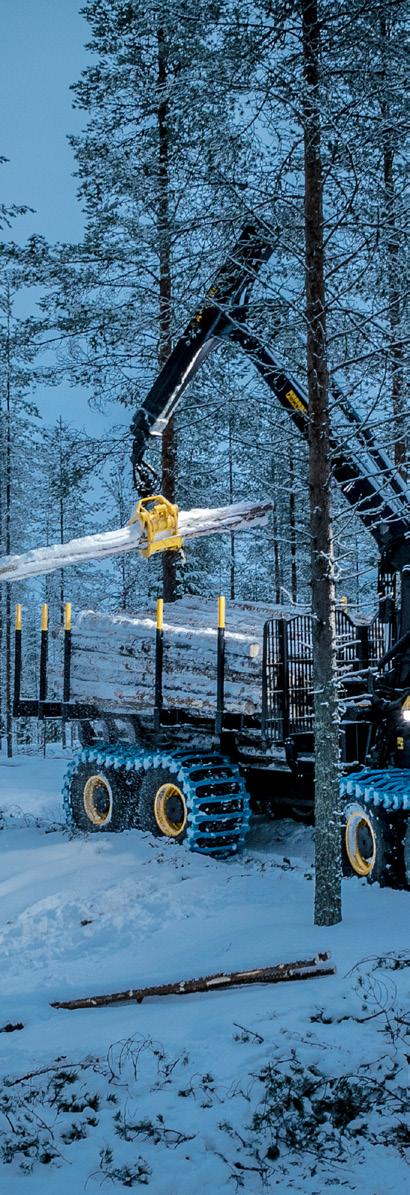
Code of Conduct
Harmonised responsibility practices are ensured based on the company’s Code of Conduct and values. We require Ponsse’s employees and partners to comply with the principles of our Code of Conduct and respect our values whenever they work with or represent Ponsse.
Code of Conduct training is part of the induction programme for our new employees, and supervisors monitor the completion of training in annual performance appraisals. Our ethical business is also supported by our whistleblowing channel, which has been used since 2020 and allows any suspected misuse related to Ponsse and its operations to be reported. When the Code of Conduct was prepared in 2020, training was completed by 92.4% of Ponsse people.
The update of the Code of Conduct approved by the company’s Board of Directors in 2020 and related training was postponed from 2023 to 2024, as it will address the assessment of the impact on human rights conducted at the end of 2023. The Code of Conduct is available on our website, where you can also find a public link to our ethical reporting channel.
03 GOVERNANCE IN PRACTICE 01 Environmental responsibility 02 Social responsibility 03 Governance
Whistleblowing channel
When Ponsse employees or our stakeholders have concerns regarding the violation of our Code of Conduct or law, such concerns should be reported to the company. We encourage employees to report any concerns or violations to their immediate supervisor, HR management or the company’s management as the first instance. Reports can also be submitted anonymously through Ponsse’s whistleblowing channel, which an external service provider maintains in nine different languages on our website. The reporting channel is also open to Ponsse’s external stakeholders.
The whistleblowing team appointed by Ponsse’s Board of Directors processes reports submitted through the channel and forwards them to the Management Team or the Board of Directors, if required. The team ensures that reports are processed and consequences are imposed identically in similar cases and that corrective measures are carried out.
In 2023, 15 reports were submitted to the whistleblowing channel. The anonymously submitted reports were divided into the following topics: 3 discrimination and harassment (2022: 1); 1 misuse (1); 2 corruption (2); 4 HR procedures and guidelines (2); 1 privacy protection and the protection
of personal data, and security in network and information systems (1); 1 compliance (0); 1 environment (0); 2 conflicts of interest (0); 0 other (6); 0 not relevant (1).
The single case of misuse was reported to the authorities and is being investigated by the police. The financial value of the case is low. All other investigated cases were processed internally. In 2023, we started to divide reports into risk categories at the beginning of the process. Two of the submitted reports were assigned to the high-risk category, two to the medium-risk category and the rest to the low-risk category.
In addition to the cases reported through the whistleblowing channel, the company obtained information, through auditing in 2023, about ongoing legal cases involving Ponsse Latin America Ltda, Ponsse’s subsidiary in Brazil. The cases are related to the employment relationships of local employees, and their estimated financial value is low.

03
Ponsse’s whistleblowing channel: https://report.whistleb.com/en/ponsse Governance

Management systems
The company’s management systems steer the implementation of Ponsse’s sustainable development principles and responsible leadership. The goal of the systems is to standardise the Group’s operations and ensure the company’s continuous development. The recertification conducted every three years was last carried out at Ponsse in 2022.
Ponsse Plc and its subsidiaries comply with the following management systems:
• ISO 9001 quality management standard: Ponsse Plc, Epec Oy, Ponsse Chile S.p.A., Ponsse Latin America Ltda, Ponsse Uruguay S.A.
• ISO 14001 environmental management standard: Ponsse Plc, Epec Oy
• ISO 45001 occupational health and safety management standard: Ponsse Plc, Ponsse Chile S.p.A., Ponsse Uruguay S.A., Epec Oy
• ISO 27001 information security management system standard: Epec Oy.
In 2023, internal audits and audits of the supplier and distribution network in accordance with Ponsse’s operating processes were conducted in line with the regular audit programme. Ponsse Chile S.p.A, Ponsse Group’s subsidiary in Chile, received the ISO 9001 quality management certificate and the ISO 45001 occupational health and safety management certificate in December 2023.
In addition, the production of Epec Oy, Ponsse’s Finnish subsidiary, which develops and manufactures information system solutions, has been certified by TÜV SÜD in accordance with the EN ISO 13849, IEC 61508 and EN IEC 62061 operational safety standards. Safety components certified in accordance with operational safety help implement safety features that meet the requirements set in the standards in the safety products the company develops and manufactures. Epec also complies with the requirements of the IATF 16949 standard.
88
03
GOVERNANCE IN PRACTICE 01 Environmental responsibility 02 Social responsibility 03 Governance
Policies and guidelines
We always act in accordance with the laws and regulations of the country in which we operate. It is the responsibility of all employees to be aware of relevant laws affecting their tasks and in case of doubt, to seek advice to ensure compliance.
The Code of Conduct is supplemented by public policies and internal guidelines. The Group’s Management Team approves all key policies and guidelines that guide Ponsse’s operations.
Governance
Internal:
• Gifts and hospitality
• Insider guidelines
• Equality and non-discrimination plan
• Information security policy
External:
• Code of Conduct
• Procurement policy
• Remuneration policy
• Risk management policy
• Supplier Code of Conduct
• Communication policy
• Operating policy
• Tax policy

03
89
GOVERNANCE IN PRACTICE

Tax policy
We want to promote an open tax policy, and we comply with valid tax laws and regulations in all the countries where Ponsse operates. The company has no separate taxation-based corporate structures. We are committed to paying respective statutory taxes and fees without delay wherever we operate and produce results. We comply with the OECD transfer pricing guidelines and regularly ensure that intra-group pricing is based on market terms.
We report and publish our tax information in accordance with legislation and the transparency goals set in our tax policy. The goal of our tax management is predictable and effective taxation with high morals. We are engaged in close cooperation with the Large Taxpayers’ Office in Finland.
In 2023, Ponsse paid a total of EUR 49.5 million (2022: EUR 39.3 million) in taxes and duties, of which EUR 27.0 (20.0) million in Finland. The figures only cover continuing business operations. The application of country-specific tax reporting (CbCr) started during the 2023 financial period after consolidated revenue exceeded the limit of EUR 750 million during the 2022 financial period. In 2023, we launched the process of issuing country-specific tax reports. A countryspecific tax report will be provided for the Finnish Tax Administration by the end of 2024.
90
03 01 Environmental responsibility 02 Social responsibility 03 Governance
The goal of our tax management is predictable and effective taxation with high morals.
91 03 Governance
Plc Epec Oy
AB Ponsse AS Ponsse Chile S.p.A. 1) Ponsse China Ltd. Ponsse Czech s.r.o. 2) Ponsse Latin America, Ltda. Ponsse Machines Ireland Ltd. Ponsse North America, Inc. Ponsse UK Ltd. Ponsse Uruguay S.A. Ponssé S.A.S Total 13,049 386 240 79 72 6 91 0.1 2 1,394 96 454 351 16,220 821,800 251 858 4,484 827,393 -633,641 -115,262 -6,406 -16,794 -16,220 -788,323 6,193 401 216 0 593 308 82 3 4 2,983 72 576 295 11,726 2023 2022 Corporate taxes and real estate taxes paid by country Financial added value produced and distributed by Ponsse in 2023, EUR thousand 1) Ponsse Group’s subsidiary since 17 March 2022 Net sales Proceeds from the sale of assets Income from investments Other income Total Operating expenses Personnel salaries and fees Payments to lenders Dividend distribution Corporate taxes and real estate taxes paid by the Group Total 2) Ponsse Group’s subsidiary since 1 April 2022 Direct financial added value produced Financial added value distributed Surplus financial value 39,07O
Ponsse
Ponsse
Good corporate governance
Ponsse complies with good corporate governance in accordance with Finnish law, Ponsse’s Articles of Association, and the Corporate Governance Code 2020 for listed companies, while promoting openness and transparency. The purpose of the corporate governance principles is to ensure ethical business and a high level of professionalism. In compliance with the Corporate Governance Code, we have published a report on Ponsse’s governance and control system for the 2023 financial period, which is available on the company’s website.
According to good corporate governance, Ponsse protects the rights of its shareholders, conducts diligent and correctly timed financial reporting, and provides the organisation’s managers with guidance. Auditing, internal control and audit, risk management, compliance with legislation and regulations, and management and administrative practices have been arranged appropriately, and the most significant business activities and conflicts of interest are evaluated on the basis of risks.
Ponsse’s shares are listed on Nasdaq Helsinki, and we comply with the guidelines and regulations of the Helsinki stock exchange and the Finnish Financial Supervisory Authority. In economic sustainability, we focus on a balance between
profitability, cash flow from business operations and growth to ensure our company’s long-term financial performance. Consolidated financial statements and interim reports are prepared in accordance with the International Financial Reporting Standards (IFRS).
Ponsse’s highest decision-making body is the Annual General Meeting. The General Meeting appoints the company’s Board of Directors, which is responsible for the company’s administration and the appropriate organisation of operations. There are no separate committees within Ponsse’s Board of Directors. The company’s Board of Directors has not found it necessary to establish any committees, given the number of members of the Board of Di-
92
03 GOVERNANCE IN PRACTICE 01 Environmental responsibility 02 Social responsibility 03 Governance
rectors and its effectiveness. The President and CEO appointed by the Board of Directors is responsible for the operational management of Ponsse Group, assisted by the Group’s Management Team.
Diversity and independence of the Board of Directors
The members of the Board of Directors are required to have a sufficiently diverse expertise and the ability to carry out their tasks effectively. Key factors include that education and experience supplement those of other members. When preparing the composition of the Board of Directors, the goals set for Ponsse’s operations are given particular attention.
Diversity in the Board of Directors promotes an open culture of discussion and the ability to adopt an open approach to innovative ideas. Diversity is supported by a consideration of age and gender distribution, educational backgrounds, and work and international experience. It benefits the company as a whole that individuals whose skills, backgrounds and views differ from one another are appointed as members of Ponsse’s Board of Directors. This ensures the development of business and responsibility, as well as good corporate governance. The company’s long-term goal is to increase diversity in the Board of Directors even further.
During the 2023 financial period, women and men were represented in Ponsse’s Board of Directors, as in previous years. Of the seven members of
the Board of Directors, two were women, representing 29% of all members. Educational backgrounds and work experience covered expertise in finances, legal affairs, technology, international and strategic sales and marketing, and responsibility. More information about the professional backgrounds and positions of trust of the members of the Board of Directors is available on the company’s website.
According to recommendation 10 of the Corporate Governance Code, the majority of board members must be independent from the company. Of the board composition selected by the 2023 general meeting, all other board members were independent from the company except for Jarmo Vidgrén. Jarmo Vidgrén was employed by the company from January 1 to May 31, 2020. During 2023, he also worked as a consultant for the company. Five members of the board are also independent of the company’s significant shareholders. The number of members independent of significant shareholders increased to 71% (2022: 50%) in accordance with the recommendation of the Corporate Governance Code. Of the members, Mammu Kaario has been a member of Board of Directors for 14 years and Jukka Vidgrén for 13 years without interruption. Based on the Board of Directors’ overall assessment, the independence of the Board members has not been at risk due to this long-term membership, and no other factors have been identified that would reduce their independence.
03
93
Governance
Remuneration principles and conflicts of interest
The goal of the company’s remuneration policy is to advance the company’s long-term financial performance and the building of a sustainable shareholder value by recruiting, committing and motivating senior managers and employees to fulfil Ponsse’s strategy. One of the key principles of the remuneration policy is that remuneration is generally competitive, and attracts and commits employees to the company. In addition, remuneration must be fair, equal and easy to understand.
The Board of Directors monitors and ensures the fulfilment of the remuneration policy annually. Each year, the Board of Directors presents a
remuneration report at the Annual General Meeting, based on which shareholders can assess the fulfilment of the remuneration policy. Ponsse’s remuneration report for the 2023 financial period is available on the company’s website.
The remuneration policy also addresses the prevention of conflicts of interest. The company’s President and CEO does not participate in the processing of matters or decision making concerning their remuneration. Because of the company’s ownership structure, the Board of Directors can decide that certain members of the Board of Directors can also be employed by the company on separate employment terms that
94
03
Dependent on the company and its major shareholder Independent Independent Independent Independent Independent Dependent on the major shareholder Jarmo Vidgrén, Chair Mammu Kaario, Vice Chair Terhi Koipijärvi Matti Kylävainio Ilpo Marjamaa Juha Vanhainen Jukka Vidgrén Male Female Female Male Male Male Male 2020 2010 2023 2016 2022 2018 2011 4 14 1 8 2 6 13 Member of the Board Gender Year of commencement of term of office Number of terms of office Independence of the company and its major shareholders 01 Environmental responsibility 02 Social responsibility 03 Governance
comply with the company’s general employment principles. The members of the Board of Directors who have separate employment terms do not participate in any preparation or decision making concerning employment terms, as such decisions are made by independent members.
Corruption and competition
We are committed to combating corruption in all its forms, including extortion and bribery. We do not use bribes or other unlawful payments, nor do we authorise these payments to gain or maintain business. Corruption is also covered by Code of Conduct training, which is mandatory for all the Group’s employees. Ponsse assesses corruption risks as part of its continuous risk management process. Key risks are summarised in conjunction with the strategy round for assessment by the Board of Directors and management. We are developing the group’s corruption risk assessment and management process during the year 2024.
The company neither offers nor accepts any favours, gifts or benefits which could be reasonably assumed to inappropriately influence decision making or even give such an impression. The company has internal guidelines for gifts and hospitality.
We do not accept or facilitate money laundering, and we comply with legislation related to
the prevention of money laundering everywhere in the world. We conduct business only with reputable parties involved in legitimate business activities, with funds derived from legitimate sources. During tendering and negotiation processes, we conduct background checks to verify that customers, suppliers or any other key stakeholders are not in breach of law or regulations and are not subject to economic sanctions.
In the know-your-customer process, Ponsse uses a data and analytics service of an external service provider to control business risks. During 2024, we will expand the analysis to ESG data to support the identification and selection of ethical and responsible partners.
We promote fair and honest competition. We comply with applicable competition law, regardless of the market area, and refrain from entering into or carrying out any illegal practices. Our assets may not be used for unlawful or improper purposes. In accordance with the GDPR requirements, we respect and protect personal data, and employees processing it are expected to exercise special caution when processing data.
Female share of seats on Ponsse’s Board of Directors
29%
03
95
Governance
03

Key association memberships
Ponsse Plc:
• Bioenergy Association of Finland
• Finnish Business & Society FIBS
• Koodi/Sisu
• Kuopio Region Chamber of Commerce
• Lappeenranta-Lahti University of Technology (LUT)
• Mechanical Engineering and Metals Industry Standardization in Finland
• Finnish Family Firms Association
• Stiftelsen Skogsbrukets Forskningsinstitut
• Association for Finnish Work
• Excellence Finland
• Finnish Forest Association
• Federation of Finnish Enterprises
• Sustainable Industry X, Mobile Work Machines
• Technology Industries of Finland
Epec Oy (Finland):
• AEF Agricultural industry electronics
• Forum for intelligence Machines ry
• South Ostrobothnia Chamber of Commerce
• Mechanical Engineering and Metals Industry Standardization in Finland
• Agricultural Industry Electronics Foundation
• Technology Industries of Finland
Ponsse AB (Sweden):
• Confederation of Swedish Enterprise
• Maskinleverantörerna
Ponsse AS (Norway):
• Maskinentreprenørenes Forbund
Ponsse North America Inc. (USA):
• Forest Resources Association Inc
• MRA The Management Association Inc
• CESA 8 Cooperative Educational Service Agency
01 Environmental responsibility 02 Social responsibility 03 Governance
Public subsidies
In 2023, Ponsse Plc received a total of EUR 1,081,369 in public subsidies, of which EUR 930,114 was allocated to other operating income in relation to various development projects.
Investment subsidies, of which a total of EUR 151,255 was received in 2023, have been recognised as deductions from fixed assets in the company’s accounting. The investment subsidies were allocated to the procurement of solar power plants, charging stations for electric vehicles, and the E-Power filter to improve the quality of electricity and reduce electricity consumption. The subsidies were granted by Business Finland, ARA and the Finnish Transport and Communications Agency (Traficom).
Ponsse’s subsidiary Epec Oy received a total of
EUR 296,583 in public subsidies in 2023 that was allocated to other operating income in relation to various development projects. The subsidies were granted by Traficom and Business Finland. Ponsse’s other subsidiaries did not receive any public subsidies in 2023.
In March 2023, Business Finland granted EUR 10 million in funding for the joint FORWARD’27 programme of Ponsse and Epec in its challenge competition for leading companies. The five-year FORWARD’27 programme is a leading project, around which a research ecosystem of partnering companies and organisations will be built. The goal of the programme is to significantly reduce the emissions and energy consumption of machines and improve their productivity.
03
The goal of the programme is to significantly reduce the emissions and energy consumption of machines and improve their productivity.
97
Governance
Responsibility – risks and opportunities
The risk management policy approved by the Board of Directors guides risk management as part of the company’s management system. Ponsse’s management actively monitors the development of the business environment, and responsibility risks and opportunities affecting our business are also considered in the annual risk assessment. Within them, aspects related to climate change, biodiversity and resource efficiency together with digitalisation and technological development, are emphasised.
At the end of 2023, we prepared an internal climate risk assessment, and we will continue to develop the assessment as part of our climate activities on the basis of its results. More than 40 Ponsse people from different functions and subsidiaries participated in the assessment of climate risks and opportunities. The climate risk assessment was conducted applying the reporting framework of the Task Force on ClimateRelated Financial Disclosures (TCFD).
The most significant opportunities were related to new technological solutions and services that enable low-emission harvesting. The most significant risks included physical risks associ-
ated with an increase in extreme weather and the impact caused by the average global temperature rise on our operations and value chains. The risk of extreme weather became a reality in Vieremä in June 2023 when exceptionally heavy rainfall clogged storm drains in the factory area, causing water damage in our facilities. As a result of the incident, storm drains were modified and our preparedness for crises was evaluated.
At the end of 2023, we carried out the Human Rights Due Diligence (HRDD) process assisted by external human rights specialists. Based on this human rights impact and risk assessment, which was the first of its kind for Ponsse, the specialists
98 03
GOVERNANCE IN PRACTICE 01 Environmental responsibility 02 Social responsibility 03 Governance
recommended a specific focus on the prioritised themes listed in the table below.
Other financial and short-term risks associated with the company’s business operations are described in the Board of Directors’ Report.
Governance
Human rights risks (to be prioritised)
Human rights theme
Protection of life and health, as well as young employees
Prioritised risk
• Safety in production processes and maintenance
• Safe use and transport of products
• Tasks, working hours and supervision of employees and trainees aged under 18 years, without placing their development and health at risk
Control measures and activities
• Development of the occupational safety culture
• Monitoring, intervention and engagement throughout the organisation in accordance with the strategic role of occupational safety and health, as well as the management’s example to develop the safety culture
• Preparing global guidelines for occupational safety and health
• Already addressing safe maintenance measures in the product design phase
• Protecting employees aged under 18 years from tasks that place their development and health at risk
Equality and non-discrimination, opportunity to show one’s own identity
Responsible procurement
• Equal and respectful treatment in the working community
• Opportunities of diverse target groups to use machinery and equipment safely and appropriately
• Diversity and acceptance in the working community, understanding of different perspectives and backgrounds
• Gender-biased tasks and communication
• The planned and systematic management of responsibility in the procurement chain, while addressing high-risk human rights industries, raw materials and countries
• Strengthening diversity and inclusion
• Addressing diversity in machine and equipment design while engaging stakeholders
03
• Development of a responsibility programme for procurement
• Identification of country- and industry-specific human rights risks for Tier 1 suppliers, including suppliers inside and outside the EU
• Concrete and strengthened human rights perspectives in the Supplier Code of Conduct
• An action plan for the responsible procurement of high-risk raw materials
99
Climate risks
Impact Transition risks
Regulation
• Impact of regulation and taxation on competitiveness and financial performance
• Additional costs from reporting and the monitoring of legislation
• An increase in raw material and transport costs. For example, the impact of the discontinuation of free emission allowances on the steel industry, the energy sector and sea and road transport.
• Regulation to mitigate climate change and nature loss may also have an impact on the processing of commercial forests.
Reputation and markets
• Negative changes in stakeholders’ attitudes and mindsets regarding the use of forests
• A negative impact on our reputation if we are unable to respond to our stakeholders’ expectations of responsible business
Control measures
• The monitoring of legislation and reporting capabilities, including the development of systems and competence, and resourcing
• Emissions reduction, carbon neutrality and material efficiency goals
• Systematic development of the environmental programme
• Resource efficiency, long-term procurement agreements and alternative procurement channels
• The suitability of PONSSE forest machines for different forest management methods
• Sustainability as part of the business strategy
• R&D activities that enable continuously more ecological harvesting
• Open and transparent stakeholder communication and active interaction
• Flexibility in operations and sensitivity to changes help adapt to changes in the operating environment.
• The large market area evens out any risks of economic fluctuations.
• Our confidential stakeholder relations and advanced product and service range enable growth and development.
Products and technological solutions
• Changes in operating models and competence needs
• Any failure or incorrect timing in the development of new low-emission technologies, development costs or high product prices
• The world’s first electric forwarder concept
• Development of forest machine automation, safety, ergonomics, digitalisation, and technologies related to biodiversity and forest resilience
• Close cooperation with our customers and stakeholders ensures technological development that advances in the correct direction and meets the future needs of forestry.
• Cooperation with higher education institutions, universities and research organisations
• Focus on the cut-to-length method and reducing the environmental impact of products
• Circular economy solutions to extend the lifecycle of used machines and spare parts
Opportunities
• Compliance and responsible operations enable the long-term success and vitality of business operations.
• Regulation on corporate responsibility harmonises companies’ sustainability data and allows stakeholders to compare different companies.
• Regulation on corporate responsibility facilitates the identification of any adverse impact on business operations.
• New business opportunities
• Producing value in society through responsible solutions
• New business opportunities through sustainable innovation
• Opportunities offered by green funding to constantly develop sustainable products with lower emissions and reduce the environmental impact of operations.
• Responsibly made and innovative products that reduce the environmental impact of harvesting and promote the efficient use of renewable raw materials
• Technologies related to biodiversity and improving forest resilience in forest management and education
• New technological solutions that enable zeroemission harvesting
• New business opportunities in the circular economy
• Improving the efficiency of operations and transport
• New low-emission energy sources and technologies
100
01 Environmental responsibility 02 Social responsibility 03 Governance
Physical risks
Acute
Impact
• Extreme weather causes interruptions in production, deliveries or the availability of energy, and makes field maintenance more difficult.
• An increase in insurance premiums and the repair of damage generate costs.
• Increasing wildfires have a local impact on harvesting.
Control measures
• The availability of electricity in our production facilities has been secured, and they are located in areas where extreme weather is rare.
• Raw materials and components are mainly procured from areas where extreme weather is uncommon.
• We invest in supplier relationships and develop cooperation while addressing the environment.
Opportunities
• New technologies applicable to changed conditions
• PONSSE firefighting equipment to help adapt to increasing wildfires
Chronic
• Changes in average temperatures and weather models change forest growth seasons and locations, as well as the distribution of species. Impact on market areas and forest use methods.
• Wildfire risks and more difficult working conditions in harvesting operations.
• Damage caused by tree diseases and pests, invasive species, and changes in the distribution of species. Deteriorated forest health and recovery ability reduce tree growth.
• A shorter frost period has a negative impact on harvesting conditions and wood transport and shortens the harvesting season.
• Science-based emissions reduction measures
• Solutions that support sustainable forestry and the preservation of nature
• CTL forest machines enable different forest use methods and harvesting in various harvesting conditions.
• Extensive experience in different harvesting conditions and market areas
• Cooperation and development with various parties in the value chain
• Use of the Ponsse training network in disseminating and collecting information
• Longer growth seasons in the northern hemisphere
• Closer cooperation in terms of technological development in the value chain
• Business opportunities offered by new technologies, including in the assessment of commercial forest regeneration, harvesting quality and diversity and in the monitoring of forest resources
101
Sustainability reporting at Ponsse
On 13 March 2024, Ponsse Plc published a separate annual report and sustainability report in Finnish and English. The Board of Directors’ report published as part of the annual report also covers non-financial information in accordance with the Accounting Act (1376/2016). The information is also included in the sustainability report, which describes the company’s sustainability work more broadly.
In addition to the parent company, the consolidated information presented in the sustainability report includes all the Group’s subsidiaries for the reporting period 1 January to 31 December 2023. Ponsse’s sustainability reporting is based on the Global Reporting Initiative (GRI) standards where applicable, but does not cover all requirements of the GRI indicators identified as material. The sustainability report has not been verified by a third party.
In 2023, the company started a development project to prepare for the EU Corporate Sustainability Reporting Directive (CSRD), which came into force at the beginning of 2024. The company carried out a
human rights impact assessment in 2023 and started a double materiality assessment, which will be completed by the end of the first quarter of 2024. The double materiality assessment identifies the most important economic, social and environmental sustainability topics that have the greatest impact and strategic value in the company’s operations. The material impacts identified in the assessment on the environment and society, as well as business risks and opportunities, lay the foundation for Ponsse’s sustainability reporting and strategic sustainability development in 2024.
Ponsse’s key sustainability priorities were determined in a materiality assessment in 2022 from the perspectives of business operations and impact. The company monitors the achievement of targets with the help of sustainability indicators and promotes the targets through annual measures. Ponsse works to improve its people’s well-being, create innovative sustainable solutions that respect nature, develop its operations without burdening nature, and be a reliable partner that values community.
Contact person for Ponsse’s sustainability work:
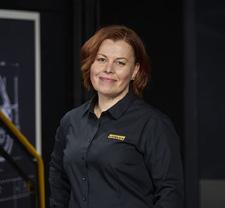
katja paananen, Chief Responsibility Officer
p. +358 40 553 2921
katja.paananen@ponsse.com

sanna lyytikäinen, ESG Controller
p. +358 50 337 2830
sanna.lyytikainen@ponsse.com
Report according to the EU taxonomy regulation can be read in Ponsse’s annual report.




layout
Gut Studio / gut.fi
printing house
Painotalo Seiska
102
CONTACT
01 Environmental responsibility 02 Social responsibility 03 Governance
More information
406–1
Organisational details
Entities included in the organisation’s sustainability reporting
Reporting period, frequency and contact point
External assurance
Activities, value chain and other business relationships
Governance structure and composition
Delegation of responsibility for managing impacts
Communication of critical concerns
Statement on sustainable development strategy
Compliance with laws and regulations
Membership associations
List of material topics
Direct economic value generated and distributed
Financial implications and other risks and opportunities due to climate change
Financial assistance received from government
Proportion of spending on local suppliers
Approach to tax
Energy consumption within the organisation
Energy intensity
Direct (Scope 1) GHG emissions
Energy indirect (Scope 2) GHG emissions
GHG emissions intensity
Waste generation and significant waste-related impacts
Waste generated
Waste diverted from disposal
Waste directed to disposal
Incidents of discrimination and corrective actions taken
Ponsse Group’s business, p. 10
Responsibility reporting at Ponsse, p. 102
Responsibility reporting at Ponsse, p. 102, Financial statements 2023
Responsibility reporting at Ponsse, p. 102
Ponsse Group’s business, p. 10–11
Good governance, p. 92–93
Responsibility management and practices, p. 84
Responsibility management and practices, p. 86–87
Our strategic responsibility goals, p. 4
Refer comment
Good governance, p. 96
Responsible management and practices p. 84–85
Good governance, p. 91
Good governance, p. 98–101
Good governance, p. 97, Shareholder register
Environmental impact of procurement and logistics, p. 39
Honesty and cooperation, p. 75–77
Good governance, p. 90
Towards carbon neutrality, p. 31
Towards carbon neutrality, p. 31
Towards carbon neutrality, p. 22, 25
Towards carbon neutrality, p. 22, 25
Towards carbon neutrality, p. 25
Waste and water, p. 36
Waste and water, p. 35–36
Waste and water, p. 34–35
Waste and water, p. 34–35
Code of Conduct and whistleblowing channel, p. 87
In 2023, there were no significant non-compliances, and no fines were imposed for failure to comply with laws and regulations.
https://www.ponsse.com/
Total energy consumption 142,414 GJ, of which 60,966 GJ from fossil fuels and 5,484 GJ from renewable fuels.
GJ/M€.
Total weight of waste diverted from disposal 2,505 t, of which non-hazardous 1,945 t and hazardous waste 561 t. Total
103
2–1 2–2 2–3 2–5 2-6 2-9 2–13 2-16 2–22 2-27 2–28 3-2 201-1 201-2 201–4 204–1 207–1 302–1 302-3 305–1 305-2 305–4 306–1 306–3
306-4 306-5
Code Indicator Location
hazardous
GRI INDEX
weight of waste directed to disposal 1,772 t, of which non-hazardous 1,295 t and
waste 477 t. Energy intensity of total energy consumption 173
company/investors/share/ share-capital-and-shares/
















































































